#these are just my interpretations of what soldier poet and king can mean!
Explore tagged Tumblr posts
Note
Daily ask №23!
Random/cursed edition!
What if I were to try and tell Fault!Wilbur where babies come from?
So. Phil has said that Tubbo's problem is not having blood in that one famous shitpost which got me into Fault in the first place. So. What if they did have blood though? Like what if some of the wax cells were filled with blood? Just spontaneously. For blood-letting purposes, yk.
I think I saw you mention somewhere that Fault!Tubbo either has or could potentially have memories from different alternative versions of themselves. Explain please?? Also does that mean that they potentially have memories from my personal au where most of my ocs and headcanons live? Btw my first reaction at that thought was "AAHH FUCK NONONONONO BITCH CHEESUS CRUST". It's not that bad though I promise I'd just be embarrassed either way.
What if. What if the Fault crew + the scp researchers got spontaneously teleported into a gacha reaction videos where they had to react to your shitposts, animations and drawings. Also throw a couple of 2018 style gacha vids in there for good measure. (While writing this I checked the lyrics of Devils don't fly and realised that it's actually a pretty serious song. Which like- damn.)
What role would the Fault crew characters get in the soldier poet king test? I do love that test a little too much maybe- here's the link to the quiz! https://uquiz.com/quiz/MYLbZ3/are-you-a-soldier-a-poet-or-a-king
This one has heavy spoilers!
1. Probably depends on how you do it, but I think he’d just take basic notes on sex-ed. Doesn’t have much puritan context of taboo or embarrassment on the subject. Fairly indifferent on the whole sex thing because he doesn’t think it’ll ever come up in his lifestyle of avoiding humans and knowing only 4 people. Probably a little irritated that its theories were so wildly off base, grumble a bit about how its own ideas about making Faustian bargains with dark entities and trading organ: [womb] for power make far more sense but whatever. He thinks pregnancy is stupid because how are you supposed to run like that? And your food is SIPHONED off by the fetus? Why can’t they get their own? And at the end you get a human. Terrible process all around. 3/10 Tommy has less ammunition to tease it now and that’s IT.
2. Probably smell bad. Maybe they could do things like blush? Mosquitoes would go crazy for them. If this is ‘a previously weren’t a blood fruit gusher’ situation, Tubbo would be freaking out about 1. Who the muffin’s blood is this and 2. Starving 2 death babyy. Cause they really need that honey to operate. A bunch of baby larva are going to die even if all the workers can go into overdrive to feed the Hive. I think it would be very funny if Tubbo tried to break into a blood bank to donate it all. Shhh don’t worry about where this blood came from. Or what happened to the security cameras. It’s for a good cause trust trust.
3.Heavy spoilers. The plan was that Tubbo and Wilbur get dunked through the near apocalypse via dissolving of the narrative due to SOMEONE being so depressed it fails to keep the void in check/potentially interpretable as being suicidal, thus exposing the two to pure void madness and realizing everything is a story. Which would entail having some familiarity/confusion about the source material of the dsmp, some vlogs, etc. but not necessarily AUs. But then SOMEONE turned out to be an abusive ass, and that plot point got very icky to me. I’ve been debating it for months, but realized I’m sexy and do what I want so am going to limit it to pure awareness of being a story, but not necessarily a fanfic. Still has the existential crisis of it and the philosophical implications that are going to so beautifully deal with themes of attachments, the purpose of narratives, and parallel whatever the hell trauma Tommy is dealing with during that section. But won’t actually deal with having any true awareness of stuff outside of Fault. Except maybe for realizing “Lawrence killed our muffining husband?!” because that scene was funny as hell to write. I dunno plans change. I’ve tried not to let outside events change my artistic vision, but it’s inevitable.
4.Oh goodness they absolutely despise me for all the jokes about the horrors they’re going through. Probably think they’re being drawn ‘cute’ given they’re probably a lot freakier looking irl, and slightly distressed about being chibis. I think most would even consider it ‘out of character’ given their self perceptions don’t tend to be the most accurate. Current Wilbur is hissing and vehement about being constantly called an it because his character development is very far off from when that happens. Philza is a little disappointed that his bloodthirsty moments gets so much emphasis since he’s so chill 97% of the time. Tommy is absolutely chuffed to bits to realize he’s the main character, though trying to do damage control cause haha I’m fine guys this crazy internet person just made me seem edgy and depressed.
Webb is going to strangle me for the Philza/Webb post tho. And the haha poor alcoholic divorcee doormat jokes. Dr. Blake assumes the blog is an anomaly and starts trying to torture it…?
5. I took the quiz sitting in the heads of all of them.
Tommy: The Poet. “So I wait for you like a lonely house till you will see me again and live in me, till then my windows ache.” “The one who hurt you haunts you. In your nightmares, they say I am disappointed in you” literally happens in Fault. With Philza. “What is a sin? Inevitable” is pretty much something he tells Tubbo word for word. “What is hell anyway? Barren” "how can you love me with all that I've done ?"
The Blade: The Soldier. “if you were to wear a crown it would be covered in blood. The one of the guilty.” “The sword is at your side. It bore your name long before you did.” is rather literal both for his name and The Blood God. “but how can I sleep with the world in my head?" “What is hell anyway? Doubt”
Wilbur: The King. “Despite all your attempts, you have never been a healer. You hurt people and they leave and you are alone in a room full of silence. You sing to try and forget, but it does not work” everything about this. Trying to heal but being made of destruction, his fears of devouring his family, singing, memory loss, everything everything it’s so Wilbur. "come and be human with me" “The one who hurt you haunts you. In your nightmares, they say I love you." <literally Phil’s last words when Wilbur killed him in the Whumptober au. "but how can I sleep with the world in my head?" why it has insomnia.
Philza: The Poet. “There are rules. How many? One, and you will follow it.” For his Collected. “Fear: You did your best and it wasn't enough. You tried and failed and kept trying and it wasn't enough. You had the power to change things and it wasn't enough.” For all his dead children. "you’re trembling, but he reaches over and he touches you, like a prayer for which no words exist" it's him reaching out. I love the reverse imagery with Phil, a god worshiping his mortals “anger is a strength in a world of apathy.” He feels no shame or burden for his anger, knowing well the good it can do. “Who taught you about guilt? The silence”
Tubbo: The King. Absolutely perfect as a foil to The Blade btw. “What is duty? Undeniable” “The throne looks golden, and covered in flowers” “Fear: You did your best and it wasn't enough. You tried and failed and kept trying and it wasn't enough.” Saving people from Philza. “The one who hurt you haunts you. In your nightmares, they say I forgive you” Rosaliiiiiind. “Who taught you about guilt? God”
#wlwdwtys ask#ask#sbi scp au#fault au#technoblade#tommyinnit#philza#tubbo#sbi au#sbi#dsmp#scp philza#scp wilbur#scp technoblade#scp tommyinnit#scp tubbo#fault spoilers#something to nom on
12 notes
·
View notes
Note
URBAN!!
i have an inquiry (and i need your opinion about this).
I don't know if you heard of this song called 'Soldier, Poet, King (or that one tiktok trend last year that uses this song). If you do know what that song is, then you probably know what I'm talking about.
A lot of people think that:
'Soldier' is Levi,
'Poet' is Hange, and;
'King' is Erwin.
See, I have no problem with it. However, it's 12:30AM in my place and it's time for my midnight thoughts to seep in.
Personally, I wholeheartedly agree that Levi is a soldier in this dynamic if it's with Hange, Levi, and Erwin. We all collectively agree to that. However, I'm having mixed thoughts about Erwin's and Hange's alignment. I, kind of, agree that Erwin would be the King because of his role as the Commander, while Hange is generally a creative person, therefore fits the Poet surface narrative. However, I think that Erwin fits better as the Poet, while Hange fits as the King.
If you think about it, it genuinely fits their narrative and growth as an individual character throughout the series. Erwin would be a poet, he's great with words. He's so great that he—y'know, convinced the soldiers to let him lead them to their deathbeds. Then there's Hange's narrative that perfectly depicts the angst aspect of being a King, especially their narrative during S4.
Anyways, what do you think? 👀
______________
Bonus (and possible hot take): in the Soldier, Poet, King dynamic;
Miche is the Soldier,
Levi is the Poet, and;
Erwin is the King.
Hey gem! Good to hear from you!
Absolutely I've heard that song and I really love how well it fits the vibe of AoT! Here's my take:
(discussion of christianity and Christ imagery below the cut)
If I had to assign just the words "soldier", "poet", and "king", I would give them to Levi, Hange, and Erwin respectively. If we went deeper and explored the song's descriptions of the titles (plus the meaning of the song itself), I would swap Hange and Erwin.
I can't deny that Levi is the Soldier. He's more than his strength of course, but he doesn't utilize words or leadership as prominently as the other characters here do. He can speak, and he can lead, but his strength has (for better or worse) always been his main feature.
I think the struggle with the second two characters is (in my opinion) how well Erwin can fit both and how Hange struggles to fit into either. When thinking of the line "He will slay you with His tongue", it's easily Erwin that comes to mind. He leads, too, but when it comes to using words, Erwin stands out more than Hange. Erwin's the Poet.
When looking at Hange as the King, I think there's more to consider than just leadership. The King in the song is a parallel to Christ*, and Christ is often depicted as a humble ruler that lives amongst his followers. I think of the campfire episode, Hange making and serving stew, eating alongside their men in a Last Supper sort of feeling.
The best connection is the line, "Whose brow is laid in thorn" representing the crown of thorns on Christ's head during his crucifixion. I view the crucifixion as a synonym for a self-sacrifice, especially from a leader to their followers, and thus I'd connect Hange's sacrificial death to the crucifixion (I think it's a stronger parallel than Erwin's death, too).
I think a lot of people consider pre-S4 personalities when comparing characters for this song, but Hange works well when we see what they accomplish as Commander. It's easier and sometimes more exciting to remember them as the creative scientist rather than the determined Scout Regiment Commander, but their actions in s4 and their last few efforts were valiant and worthy of a lot of examination.
*All three characters in the song are a parallel to Christ, but it bears the most relevance when discussing the King specifically.
Anyways, sorry to get all religion-y about it but that's how I interpret the lyrics. Thank you for the ask, gem! I hope you get/got some sleep and that your days are going well. Much love <3
8 notes
·
View notes
Text
lookism x percy jackson
look i KNOW i should stop coming up with au ideas but. i thought of a way to write that soldier poet king au and it’s a lookism x percy jackson universe
the original song was technically about recovering from abuse, and i’ll put the summarized / paraphrased / slightly changed interpretations here so it doesn’t clog up space where my notes are
soldier: physically remove the abuser and trauma they caused
poet: provide rationale against the abuser to fight their influence
king: show kindness and love to overcome aftereffects of abuse
SOLDIER: CHOI SOOJUNG
original lyric: there will come a soldier // who carries a mighty sword // he will tear your city down // oh lei oh lai oh lord
daughter of zeus: canonically daughter of one of the most powerful men ever, father has other ‘kids’ (10 geniuses are zeus’ adopted children)
my interpretation of soldier: listens to father’s instructions, the gods’ number 1 supporter, would destroy you if the orders were given to her because it’s her duty and duty is unavoidable and inevitable
soldier with og meaning: would remove any threats to the people she cares about, not afraid to get blood on her hands for law and order
weapon of choice: sword, lightning
POET: PARK HYUNGSEOK
original lyric: there will come a poet // whose weapon is his word // he will slay you with his tongue // oh lei oh lai oh lord
son of aphrodite: the signature Beautiful Guy (dg is son of apollo probably), loved by everyone, not the best at fighting but gets better
my interpretation of poet: weapon is his word because he’s a son of aphrodite he can literally charmspeak people into doing whatever the hell he wants once he learns how to do it well, slay you with his tongue bc aphrodite forced him to learn how to french kiss like irina jelavich from assassination classroom
poet with og meaning: able to confront the truth for what it is, understand it and overcome it, calm and capable of talking people down from fights
weapon of choice: bow, shapeshifting
KING: HONG JAEYEOL
original lyric: there will come a ruler // whose brow is laid in thorn // smeared with oil like david’s boy // oh lei oh lai oh lord
son of hades: not hades / hong kyeongyeong’s favorite child, but definitely is the most powerful one, inherited the most of hades’ abilities
my interpretation of king: the most powerful in terms of fighting ability & authority (let’s face it soojung is not zeus’ fav kid even though she’s the only true half-blood daughter instead of having diluted zeus blood), he’s also the one who’s most experienced with godhood so he’s the one people go to to ask what’s the ‘right’ decision
king with og meaning: if he loves you he’ll be the kindest person you’ll ever meet, would sacrifice everything and/or be a martyr if it means safety
weapon of choice: scythe, physical shadows
PLOT
prophecy: do NOT ask me to poetry right now but it basically implies hyungseok is going to destroy the gods (aka the four crews / 1st gen / pre gen), soojung and jaeyeol are also involved in the prophecy, states that one of them will die but nobody knows who. naturally they get forced to go on a quest together
expectation: soojung and jaeyeol will kill hyungseok because they’re children of the big three and hyungseok is just a nobody who got abandoned at birth and grew up with a poor mortal + he’s going to destroy their parents and they should have some filial piety right
plot twist: well guess what jaeyeol and hades are not on the best terms, jaeyeol literally would not care less if the gods got kicked off their pedestals, somehow he and hyungseok befriend each other and jaeyeol falls for him but hyungseok is oblivious. hyungseok is still hoping the prophecy has a double meaning and has 0 idea about jaeyeol’s feelings the whole time, jaeyeol gets bullied by aphrodite. actually hyungseok likes jaeyeol too but he’s scared of being bullied by aphrodite / jaeyeol hating him when he finds out / dying, so he doesn’t tell jaeyeol anything
reality: somehow someone tricks hyungseok into cursing jaeyeol and soojung to fight each other, the gods are already kind of in panic because hyungseok is pretty op by now but jaeyeol doesn’t want hyungseok to die at the end of the prophecy so he lets soojung kill him, but this is precisely the reason why hyungseok goes ballistic and destroys the gods
ENDING
we could have the good ending or the bad ending what would you prefer
bad ending: hyungseok destroys the gods but gets mortally wounded in turn, he dies hand in hand with jaeyeol and the furies rip their souls to shreds so they will never be reborn but at least they’re dead together. soojung tries her best not to get crushed under the guilt and grief of losing two of her closest friends
good ending: hades pops up at the end like damn ok. you had your character development. i guess it’s time for me to start my good dad arc. and then revives jaeyeol, so basically the gods get bullied by a half-mortal twink trying to protect his not-boyfriend who was un-alived and has now been re-alived. the prophecy works out bc nobody said dead people couldn’t come back to life + the gods got rekt that counts as being destroyed
will i write this au? i don’t know! will it be fun to write? oh absolutely
#lookism#lookism au#lookism mini fic?#i literally have the plot right there#jay hong#hong jaeyeol#daniel park#park hyungseok#crystal choi#choi soojung#i would've had gun in crystal's place but i think crystaljay is better for this#also crystaljay relationship study#bc they don't interact enough in canon#and they should#hyungseok be like when you're a child of aphrodite and you're in love with two people at the same time#but only one of them loves you back#and the one who loves you dies to save you#jay with nico di angelo vibes#grunge emo gay#with the brightest hair you've ever seen#bc hades said don't dye ur hair u useless twink so that's exactly what he did#jay's hair color changes as a metaphor for time passing#from black (night time + young and bright eyed)#to bleached blond (early morning + rebellious phase)#to platinum blond (midday + prime of his life)#and finally ash blond (dusk + he's dead)#janiel#jaeseok
33 notes
·
View notes
Text
Eleborating on this before hitting the hay
Tw for some suicide mentioning but it's like one line lol
Mind is obviously referred to the Ruler with his stolen throne.
But Poet Mind could also work with "he will slay you with his tongue" as a person who would fight verbally more then physically. Use logic in an argument, be persuasive.
The Soldier in the song is usually interpreted as someone who strives to be the king, so much they destroy everything in their path to prove to the king they are worthy. This with Mind whom "stole" the crown from Soul or Whole can fit this pretty well. Or just wants to convince himself and the audience he's in control when he's not as much
Heart,,,, "a Poet has Heart, passion" and what not. He is pretty much a bit of creativity and the strong emotions poets and writers of any type convey in their works of art.
But Heart can also be seen as the ruthless one. The one who took the furthest step and shot the sun. He engaged first in the most violent act in all of cccc. He is the raging Soldier. He is the iron fist and possibly the most violent out of the trio some would argue (and I agree)
King. Hm. Have you ever heard of the Captive audience theory? Heart tries to gain the favor of the bigger audience for peer pressure against mind or something like that. Or the whole "Whole is an Emotional person, thus Heart was the original leader of the three" interp/ theory which is kinda self explanatory
Soul, oh boyyyyyy. Starting with Poet. Soul is absent for most of Cacophony. Well maybe in RoE he's there if we talk about outside of songs implications on the Apathy thing but he kinda disappears until 7 songs later aka until TSE. I'd argue Soul isn't the physical fighter until absolute necessary, like in RoE, TSE, or the Bidding based on what you think happens there. He's threats are mostly words and stuff, really he only becomes a big asset when he's threatening suicide
Soldier,,, well. Honestly this is a matter of a physical threat type of Soul and one who stepped down from his throne and gave it to Mind to get him to stfu or something yeah. Pretty simple and all that
Ruler. I mean. He's the trident guy, the driving force of the three (despite being absent ass). But Both Heart and Mind seem to fight over Soul and his approval. Whoever gets Soul to agree with them wins and is in the right, because of how important he pretty much is (or just a tiebreaker vote ig). But he is the one who The Whole fades into in time machine. It's him who has to keep the peace between the two
Yade yada yada yeah
Idk if my ramble made sense I did this at a time where I should be sleeping LMAOO
Soldier, Poet, King CCCC addition, but you can't choose who is who because if you really think about it, they can all fit all the roles pretty well
60 notes
·
View notes
Photo

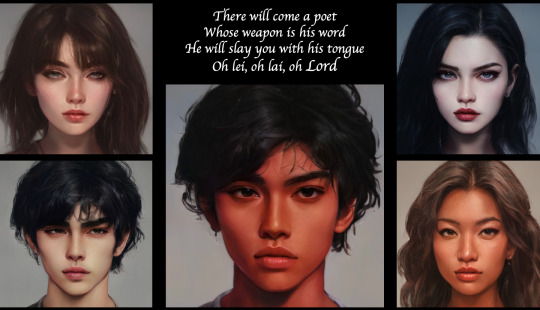
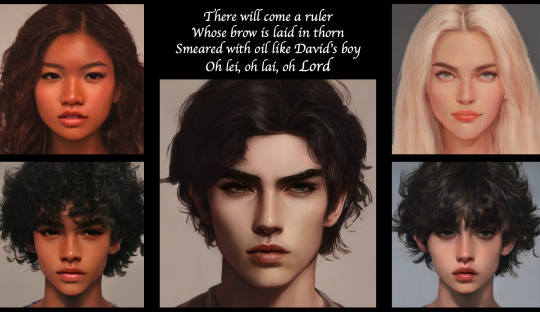
Soldier, Poet, King by the Oh Hellos has been trending (again) so I decided to participate with my OCs from A Wolf Amongst Serpents!
The Soldiers: known for their strength. Bathed in blood, surrounded by fire. They are always moving forward - no matter the cost, no matter where the road might lead.
Arion Sylph, Esmerelda Caedis, Hyperion Tydus, Selene Caedis, Theron Lycan.
The Poets: known for their charisma. They have a vision for the world, and they create the path to get it. Their words hold power, and they will use it - for better or worse.
Isabelle Tydus, Orion Livingstone, Quill Lycan, Reyna Tydus, Celestina Lycan
The Rulers: known for their duty. Heavy expectations have been placed on their shoulders. Though they might bend underneath the weight of their crowns, they do not break.
Sakura Wolff, Lucien Caedis, Ayden Caedis, Lyra Livingstone, Corvus Livingstone
#these are just my interpretations of what soldier poet and king can mean!#there are some characters that i was unsure of#lucien for example is a ruler who longs to be a poet#selene could've fit any of the three honestly#ayden can be a soldier in certain lights#sakura also longs to be a poet but she must be a ruler#hyperion longs to be a ruler but he is such a soldier#awas#a wolf amongst serpents#soldier poet king#Character Board
1 note
·
View note
Note
hii you're probably getting a TON of asks about your quiz, which read me like a book mind you- im afraid this one is no different. would love if you could elaborate on poet!! im very intrigued.
At last, here is my breakdown of my thinking behind the Poet archetype! I will say again what I said for my King and Soldier breakdowns: this is about my thinking regarding the actual archetype, it may or may not apply to you as a person, the quiz is more an interactive poem than an actual personality assessment, your personal reaction to your result will tell you a lot more than the result itself, etc.
So! Duty is the core value the quiz is centered around, and Poets reject it. Not necessarily in a rebellious sense, but the archetypal Poet believes that duty has too often been used to as an excuse for people to act in ways they think are unfair or hurtful, so they refuse to accept duty as moral in any way and want to make the world a better place with their own rules -- or lack thereof. However, they don't feel they can affect the world in traditional ways and have to find alternatives. This is where the song's lyrics come in: "there will come a poet whose weapon is his word, he will slay you with his tongue." The alternatives may or may not be effective, but the Poet's fear is that they aren't, or worse, that they're harmful. When I say that the Poet has very little to do with creativity as we usually mean it (aka art of any kind), that's what I mean. The Poet is inventive out of necessity, and it may choose art, but it may not, and it will often feel unsure or insecure about that choice; hence their envy of Soldiers, who in their eyes are much more able to have a direct effect on their environment. I also wrote Poets as explicitly lonely (each archetype is lonely in its own way, but Poets are built to be), because they feel at odds with the established order and fear they are the only one. This is why the love focused questions have Poet answers that talk of companionship. I do think though that out of the three archetypes, the Poet is the most inclined to optimism, because it inherently believes that change is possible and that fighting for it is a good thing. I do also think the archetypal Poet believes in a happy ending!
I'll also add for fun a potential reading I just thought about: Soldiers tend to be very caught in the past and what they've been through, Kings tend to be very worried about the future and whether or not they will fail the task they have been given, and Poets are probably the most likely to live in the present to try and create direct, tangible change. This makes it sound like Poets are the best one to be, but being too focused on the present may also mean you repeat mistakes or lack foresight, so they all have their ups and downs.
And one last thing since this is the third breakdown: none of the results are definitive, and none of them are meant to be absolute truths about you! Many of my friends got different results over the years, and they all interpreted that differently, because in the end they all know themselves better than any quiz with three possible results :) This quiz can give you a result that resonates with you, it may not, but your reaction to the it, to the questions, to the possible answers -- that's what actually tells you about who you are, so don't worry too much about my thinking behind the quiz if it doesn't match what you know to be true about yourself 🥰
103 notes
·
View notes
Note
K thoughts what if in the fixer penpal au the plan backfires and the reader is like oh him yeah i know childe is childe he is extremely bad at being secretive i just think that frustration would be massively entertaining
oh my god a Soldier, Poet, King ask dhsjjdjwjw yES–
That's one of the reasons why I left the story at that cuz all three of them can technically win the reader over and it's up to your interpretation as to who wins lolololol. If the reader does know Childe's occupation, I kinda doubt they'll let him off easy considering that they're the grandmaster's cousin... But then again, they're eccentric af like Varka too lmao.
After that Mondstadt festival I started imagining that Varka brings home Capitano and the reader brings home Childe and the three go "???" while the reader stands confused lmao
-----
"What are you doing here, Capitano?!"
"Who are you?... Oh. You are the eleventh harbinger."
"Yes– W-wait... You... Recognize me?!" (fanboying)
"Waaaait a minute! (Y/n), why did you bring home a harbinger this festival?!"
"I could ask you the same Varka– wait, what do you mean harbinger?"
-----
Reader's a tease. If they're as chill as Varka, they'd probably tease him to death and say something along the lines of
"You thought that light of the moon pickup line didn't you give massive villain vibes? Please, Ajax, I'm an outcast but even I don't say things that weird"
Although if they are fine with that (still doubt tho), that'll put Diluc at a MASSIVE disadvantage. Good for childe, good for childe.
#ansy-stalks#ansy's stalking: anon#tag: soldier poet king - childe thoma diluc#i will forever hate past me for making the tag that long.
11 notes
·
View notes
Text
Anonymous asked: I really enjoyed your book review of Sebastian Junger’s Homecoming. Perhaps enjoyment isn’t the right word because it brought home some hard truths. Your book review really helped me understand my older brother better when I think back on how he came home from the war in Afghanistan after serving with the Paras and had medals pinned up the yin yang. It was hard on everyone in the family, especially for him and his wife and young kids. He has found it hard going. Thanks for sharing your own thoughts as a combat veteran from that war. Even if you’re a toff you don’t come across as a typical Oxbridge poncey Rupert! As you’re a classicist and historian how did ancient soldiers deal with PTSD? Did the Greeks and Roman soldiers even suffer from it like our fighting boys and girls do? Is PTSD just a modern thing?
Part 1 of 2 (see following post)
Because this is subject very close to my heart as a combat veteran I thought very long and hard about the issues you raised. I decided to answer this question in two posts.
This is Part 1 and Part 2 is the next post.
My apologies for the length but this is subject that deserves full careful consideration.
Thank you for your lovely words and I especially find its heart warming if they touched you. I appreciate you for sharing something of the experience your ex-Para brother went through in coming home from war. I have every respect for the Parachute regiment as one of the world’s premier fighting force.
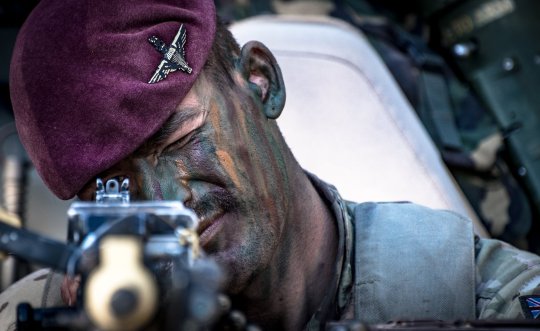
Working alongside them on missions out in Afghanistan I could see their reputation as the ‘brain shit’ of the British Army was well deserved. They’re most uncouth, sweary, and smelliest group of yobbos I’ve ever had the awful misfortune to meet. I’m kidding. The mutual respect and the ribbing went hand in hand. I doff my smurf hat to the cherry berries as ‘propah soldiers’ as they liked to say especially when they cast a glance over at the other elite regiments like HCav and the guards regiments.
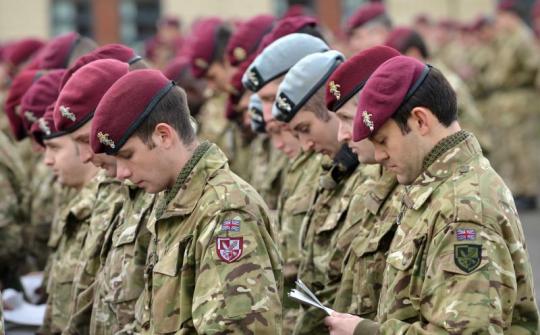
Don’t worry I’ve been called a lot worse! But I am grateful you don’t lump me with the other ‘poncey’ officers. Not sure what a female Rupert is called. The fact that I was never accused of being one by any of those I served with is perhaps something I take some measure of pride. There are not as many real toff officers these days compared to the past but there are a fair few Ruperts who are clueless in leading men under their charge. I knew one or two and frankly I’m embarrassed for them and the men under their charge.
I don’t know when the term PTSD was first used in any official way. My older sister who is a doctor - specialising in neurology and all round brain box and is currently working on the front lines in the NHS wards fighting Covid alongside all our amazing NHS nurses and doctors - took time out one evening to have a discussion with me about these issues. I also talked to one or two other friends in the psychiatric field too. In consensus they agree it was around 1980 when the term PTSD came into usage. Specifically it was the third edition of the Diagnostic and Statistical Manual of Mental Disorders (DSM-lll) published by the American Psychiatric Association in 1980 partly because as a result of the ongoing treatment of veterans from the Vietnam War. In the modern mind, PTSD is more associated with the legacy of the Vietnam War disaster.
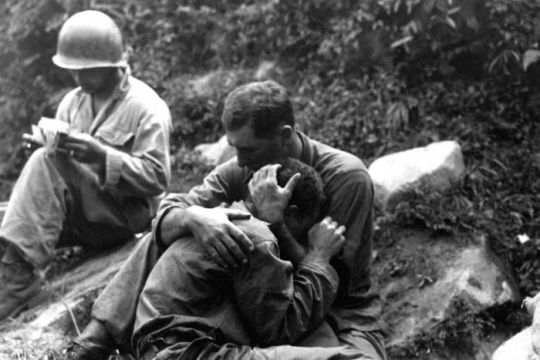
The importance of whether PTSD affected the ancient Greeks and Romans lies in the larger historical question of to what extent we can apply modern experience to unlock or interpret the past. In the period since PTSD was officially recognised, scholars and psychologists have noted its symptoms in descriptions of the veterans of past conflicts. It has become increasingly common in books and novels as well as articles to assume the direct relevance of present-day psychology to the reactions of those who experienced violent events in the historical past. In popular culture, especially television and film dramas, claims for the historical pedigree of PTSD are now often provided as background to the modern story, without attribution. Indeed we just take it as a given that soldier-warriors in the past suffered the same and in the same way as their modern day counterparts. We are used to the West to map the classical world upon the present but whether we can so easily map the modern world back upon the Greeks and Romans is a doubtful proposition when it comes to discussing PTSD.
Simply put, there is no definitive evidence for the existence of PTSD in the ancient world existed, and relies instead upon the assumption that either the Greeks or Romans, because they were exposed to combat so often, must have suffered psychological trauma.
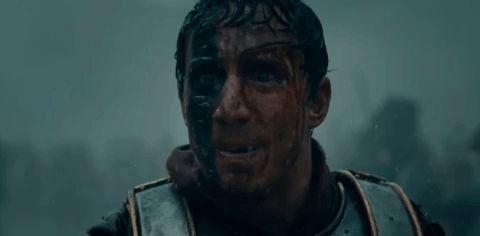
There are two schools of thought regarding the possibility of PTSD featuring in the Greco-Roman world (and indeed the wider ancient world stretching back into pre-history, myth and legend) – universalism and relativism. Put simply, the universalists argue that we all carry the same ‘wetware’ in our heads, since the human brain probably hasn’t developed in evolutionary terms in the eye blink that is the two thousand years or so since the Greco-Roman Classical era. If we’re subject to PTSD now, they posit, then the Greeks and the Romans must have been equally vulnerable. The relativists, on the other hand, argue that the circumstances under which the individual has received their life conditioning – the experiences which programme the highly individual software running that identical ‘wetware’, if you will – is of critical importance to an individual’s capacity to absorb the undoubted horrors of any battlefield, ancient or modern.
Whichever school one falls down on the side of is that what seems to happen in any serious discussion of the issue of PTSD in the ancient world is to either infer it indirectly from culture (primarily, literature and poetry) or infer it from a comparative historical understanding of ancient warfare. Because the direct evidence is so scant we can only ever infer or deduce but can never be certain. So we can read into it whenever we wish.
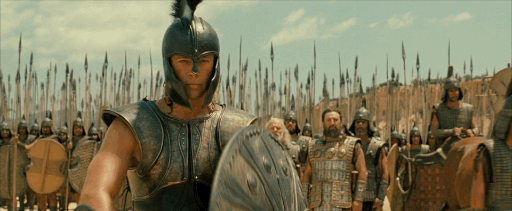
In Greek antiquity we have of course The Illiad and the Odyssey as one of the most cited examples when we look at the character traits of both Achilles and Odysseus. From Greek tragedy those who think PTSD can be inferred often point to Sophocles’s Ajax and Euripide’s Heracles. Or they look to Aeschylus and The Oresteia. I personally think this is an over stretch. Greek writers do; the return from war was a revisited theme in tragedy and is the subject of the Odyssey and the Cyclic Nostoi.
The Greeks didn’t leave us much to ponder further. But, with rare exceptions, the works from Graeco-Roman antiquity do not discuss the mental state of those who had fought. There is silence about the interior world of the fighting man at war’s end. So we are led to ponder the question why the silence?
This silence also echoes into the Roman period of literature and history too. Indeed when we turn to the Roman world, descriptions of veterans are rare in the writings that survive from the Roman world and occur most often in fiction.
In the first poem of Ovid’s Heroides, the poet writes about a returned soldier tracing a map upon a table (Ov. Her. 1.31–5):
...upon the tabletop that has been set someone shows the fierce battles, and paints all Troy with a slender line of pure wine:
‘Here the Simois flowed; this is the Sigeian territory,
here stood the lofty palace of old Priam, there the tent of Achilles...’
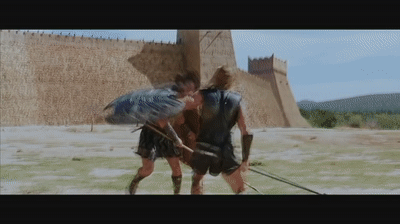
This scene provides an intimate glimpse of what it must have been like when a veteran returned home and told stories of his campaigns: the memories of battle brought to the meal, the crimson trail of the wine offering a rough outline of the places and battlefields he had experienced. The military characters in poems and plays show a world in which soldiers are ubiquitous, if somewhat annoying to the civilians. Plautus, for instance, in his Miles Gloriosus, portrays an officer boasting about his made-up conquests – the model for the braggart in A Funny Thing Happened on the Way to the Forum – and Juvenal complains about a centurion who stomps on his sandalled foot in the bustling Roman street.
Despite this silence, compelling works have been written that interweave vivid modern accounts of combat and its aftermath with quotes from ancient prose and poetry. At their best, these comparisons can illuminate both worlds, but at other times the concerns of the present-day author are imposed on the ancient material. But the question remains are such approaches truthful and valid in understanding PTSD in the ancient world?

So if arts and literature don’t really tell us much what about comparative examples drawn from military history itself?
Here again we are in left disappointed.
According to the Greek historian, Herodotus, in 480 B.C., at the Battle of Thermopylae, where King Leonidas and 300 Spartans took on Xerxes I and 100,000-150,000 Persian troops, two of the Spartan soldiers, Aristodemos and another named Eurytos, reported that they were suffering from an “acute inflammation of the eyes,”...Labeled tresantes, meaning “trembler,”. It is that Aristodemos later hung himself in shame. Another Spartan commander was forced to dismiss several of his troops in the Battle of Thermopylae Pass in 480 B.C, “They had no heart for the fight and were unwilling to take their share of the danger.”
Herodotus again in writing about the battle of Marathon in 490 B.C., cites an Athenian warrior who went permanently blind when the soldier standing next to him was killed, although the blinded soldier “was wounded in no part of his body.” Interestingly enough, blindness, deafness, and paralysis, among other conditions, are common forms of “conversion reactions” experienced and well-documented among soldiers today
Outside the fictional world, Roman military history tell us very little.
Appian of Alexandria (c. 95? – c. AD 165) described a legion veteran called Cestius Macedonicus who, when his town was under threat of capture by (the Emperor-to-be) Octavian, set fire to his house and burned himself within it. Plutarch’s Life of Marius speaks of Caius Marius’ behaviour who, when he found himself under severe stress towards the end of his life, suffering from night terrors, harassing dreams, excessive drinking and flashbacks to previous battles. These examples are just a few instances which seem to demonstrate that PTSD, or culturally similar phenomena, may be as old as warfare itself. But it’s worth stressing it is not definitive, just conjecture.
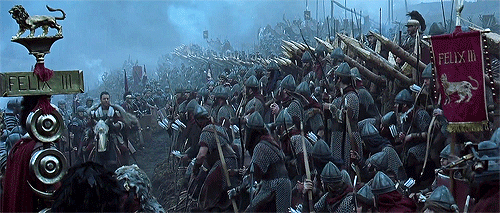
Of course of accounts of wars and battles were copiously written but not the hard bloody experience of the soldier. Indeed the Roman military man is described almost exclusively as a commander or in battle. Men such as Caesar who experienced war and wrote about it do not to tell us about homecoming.
It seems one of main challenges when we try to see military history through the lens of our definition of PTSD is to first understand the comparative nature of military history and what it is we are comparing ie mistaking apples for oranges.
The origin of military history was tied to the idea that if one understood ancient battle, one might fight and, more importantly, one might lead and strategise more effectively. In essence, much of the training of officers – even in the military handbooks of the Greeks and Romans – was an attempt to keep new commanders from making the same mistakes as the commanders of old. Military history is intended to be a pragmatic enterprise; in pursuit of this pragmatic goal, it has long been the norm to use comparative materials to understand the nature of ancient battle.
The 19th Century French military theorist Ardant du Picq argued for the continuity of human behaviour and assumed that the reactions of men under the threat of lethal force would be identical over the centuries: “Man does not enter battle to fight, but for victory. He does everything that he can to avoid the first and obtain the second....Now, man has a horror of death. In the bravest, a great sense of duty, which they alone are capable of understanding and living up to, is paramount. But the mass always cowers at sight of the phantom, death. Discipline is for the purpose of dominating that horror by a still greater horror, that of punishment or disgrace. But there always comes an instant when natural horror gets an upper hand over discipline, and the fighter flees”
These words offer insight to those of us who have never faced the terror of battle but at the same time assume the universality of how combat is experienced, despite changes in psychological expectations and weaponry, to name but two variables.
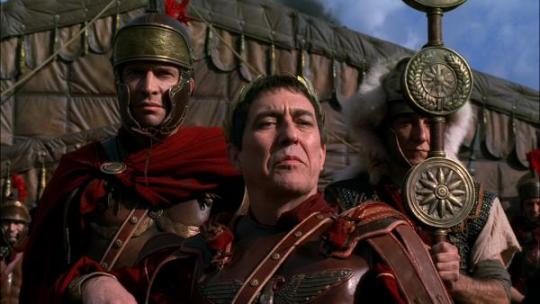
Another incentive for scholars and researchers is to turn to comparative material has been the growing awareness of the artificiality of how we describe war. A mere phrase such as ‘flank attack’ does not capture the bloody, grinding human struggle. Roman authors – especially those who had not fought – often wrote generic descriptions of battle. Literary battle can distort and simplify even as it tells, but if the main things are right – who won, who lost, and who the good guys are – the important ‘facts’ are covered. Even if one intends to speak the truth about battle, the assumptions and the normative language used to describe violence will affect the telling. We may note that the battle accounts in poetry become increasingly grisly during the course of the Roman Empire (perhaps owing to the growing popularity of gladiatorial games),while, in Caesar’s Gallic War, the Latin word cruor (blood) never appears and sanguis (another Latin word for blood) only appears in quoted appeals (Caes. B. Gall. 7.20, in the mouth of Vercingetorix, and 7.50, where the centurion M. Petronius urges his men to retreat). The realities of the battlefield are described in anodyne shorthand. In much the same way that the news rarely prints or televises graphic images, Caesar does not use gore, and perhaps for the same reason – to give a sense of reportorial objectivity.

Another element in the interpretive scrum is a given author’s goal in writing an account in the first place: Caesar, for example, was writing about himself, and he may have been producing something akin to a political campaign ad. Caesar makes Caesar look great and there is reason to believe that, if he was not precisely cooking the books, he did give them a little rinse to make him look more pristine. Given the many factors that complicate our ability to ‘unpack’ battle narratives, Philip Sabin has argued that the ambiguity and unreliability of the ancient sources must be supplemented by looking at the “form of the overall characteristics of Roman infantry in mortal combat”. Again the modern is used to illuminate that which is obscured by written accounts and the “the enduring psychological strains” are merely unconsciously assumed.
These legitimate uses of comparative materials have led to a sort of creep: because military historians have used observations of how men react to combat stress during battle to indicate continuity of behaviour through time, there appears to be a consequent expectation that men will also react identically after battle. This creep became a lusty stride with modern books written about the ancient world and PTSD.
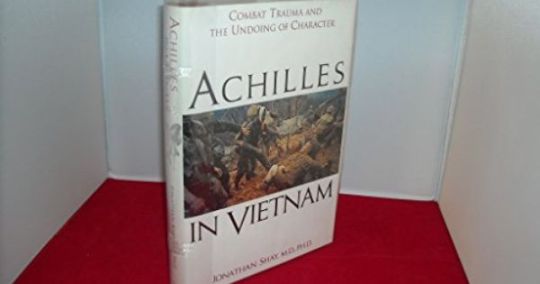
After I finished my tour in Afghanistan I read many books recommended to me by family and friends as well as comrades. One of these books is well known in military circles - at least amongst the thinking officer class - as an iconic work of marrying the ancient world and the modern experience of war. I read it and I was touched deeply by this brilliant therapeutic book. It was only months later I began to re-think whether it was a true account of PTSD in the ancient world.
This insightful book is called Achilles in Vietnam by Jonathan Shay. Shay is psychiatrist in Boston, USA. He began reading The Iliad with Vietnam veterans whom he was treating. Achilles in Vietnam, is a deeply humane work and is very much concerned with promoting policies that he hoped would help diminish the frequency of post-traumatic stress. His goal was not to explain ancient poetry but to use it therapeutically by linking his patients’ pain to that of the Iliad’s great hero. His book offers a conduit between the reader and the experiences of the men that Shay counsels. In the introduction to this work he makes a nod to Homerists while also asserting the primacy of his own reading:
“I shall present the Iliad as the tragedy of Achilles. I will not glorify Vietnam combat veterans by linking them to a prestigious ‘classic’ nor attempt to justify study of the Iliad by making it sexy, exciting, modern or ‘relevant’. I respect the work of classical scholars and could not have done my work without them. Homer’s poem does not mean whatever I want it to mean. However, having honored the boundaries of meaning that scholars have pointed out, I can confidently tell you that my reading of the Iliad as an account of men in war is not a ‘meditation’ that is only tenuously rooted in the text. “
After outlining the major plot points around which he will organise his argument, he notes, “ ‘This is the story of Achilles in the Iliad, not some metaphorical translation of it”.
The trouble was and continues to be is that many in the historical and medical fields began to rush to unfounded conclusions that Shay, on the issue of PTSD in the ancient world, had demonstrated that the psychological realities of western warfare were universal and enduring. More books on similar comparative themes soon emerged and began to enshrine the truth that PTSD was indeed prevalent throughout the ancient world and one could draw comparative lessons from it.
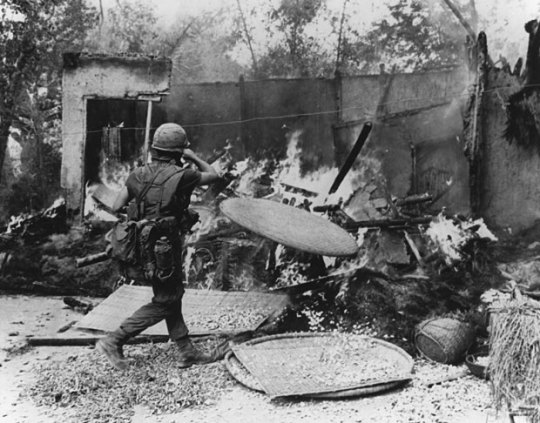
Perhaps one of the most influential books after Shay was by Lawrence Tritle. Tritle, a veteran himself, wrote From Melos to My Lai. It’s a fascinating book to read and there are parts that certainly resonate with my own experiences and those of others I have known. In the book Tritle drew a direct parallel between the experiences of the ancient Greeks and those of modern veterans. For instance, Xenophon, in his military autobiography, presents a brief eulogy for one of his fallen commanders, Clearchus. Xenophon writes that Clearchus was ‘polemikos kai philopolemos eschatos’ (Xen. An. 2.6) – ‘warlike and a lover of war to the highest degree’.
Tritle comments:
“The question that arises is why men like Clearchus and his counterparts in Vietnam and the Western Front became so entranced with violence. The answer is to be found in the natural ‘high’ that violence induces in those exposed to it, and in the PTSD that follows this exposure. Such a modern interpretation in Clearchus’ case might seem forced, but there seems little reason to doubt that Xenophon in fact provides us with the first known historical case of PTSD in the western literary tradition.”
Arguably in the West and especially our current modern Western culture is predicated at baulking at the notion of being ‘war lovers” as immoral. But such an interpretation speaks more of our modern Christianised ambivalence towards war; to the Spartans and Athenians the term would not have had a negative connotation. ‘Philopolemos’ is, in fact, a compliment, and the list of Clearchus’ military exploits functions as a eulogy. There are points where his analysis does not adequately address the divergences between ancient and modern experiences.
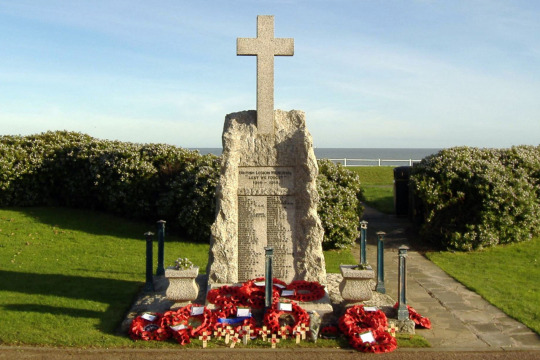
For all the talk of our Western culture being rooted in Ancient Greece and Rome we are not shaped by the same ethics. Our modern ethics and our moral code is Christian. There is no such thing as a secular humanist or atheist both owe a debt to Christianity for the way they have come to be; in many respects it’s more accurate to describe such people as Christianised Humanists or Christian Atheists even if they reject the theological tenets of the religious faith because they use Christian morality as the foundation to construct their own. Many forget just how brutal these ancient societies were in every day life to the point there would be little one could find recognisable within our own modern lives.
Now we come to third point I wish to make in determining where the Greeks or Romans actually experienced PTSD. This is to do with the little understood nature of PTSD itself. As much as we know about PTSD there is still much more we don’t know. Indeed one of the most problematic and complicated issues is the continued disagreement around the diagnosis and specific triggers of the disorder which remain little understood. We have to admit there are competing theories about what causes PTSD but, in terms of experiences that make it manifest, there are essentially three possible triggers: witnessing horrific events and/or being in mortal danger and/or the act of killing – especially close kills where the reality of one’s responsibility cannot be doubted. The last of these was strongly argued in another scholarly book by D. Grossman, On Killing, the Psychological Cost of Learning to Kill in War and Society (1995).
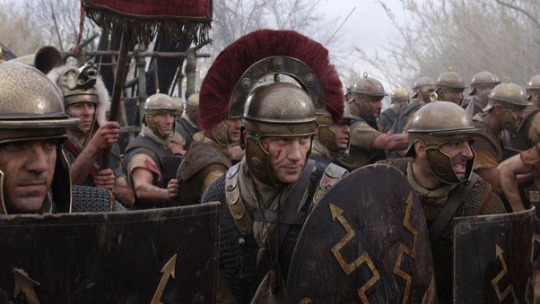
Roman soldiers had the potential to experience all of these things. The majority of Roman combat was close combat and permitted no doubt as to the killer. The comparatively short length of the gladius encouraged aggressive fighting. Caesar recounts how his men, facing a shield wall carried by the taller Gauls, leaped up on top of the shields, grabbed the upper edges with one hand, and stabbed downwards into the faces of their opponents (Caes. B. Gall. 1.52). As for mortal danger, Stefan Chrissanthos in his informative book, Warfare in the Ancient World: From the Rise of Uruk to the Fall of Rome, 3500BC-476AD, puts it this way: “For Roman soldiers, though the weapons were more primitive, the terrors and risks of combat were just as real. They had to face javelins, stones, spears, arrows, swords, cavalry charges, and maybe worst of all, the threat of being trampled by war elephants.”
Such terrors are regularly attested. During his campaign in North Africa, Caesar, noting his men’s fear, procured a number of elephants to familiarise his troops with how best to kill the beasts (Caes. B. Afr.72). It should also be noted that it was not unusual for the reserve line to be made up of veterans because they were better able to watch the combat without losing their nerve. Held in reserve, they had to watch stoically as their comrades were injured and killed, and contemplate the awful fact that they might suffer the same fate. This was not a role for the faint of heart.
However, while the Romans certainly had the raw ingredients for combat trauma, the danger for a Roman legionary was much more localised. Mortars could not be lobbed into the Green Zone, suicide bombers did not walk into the market, and garbage piled on the street did not hide powerful explosives. The danger for a Roman soldier was largely circumscribed by his moments on the field of battle, and even here, if he was with the victorious side, the casualties were likely to be light: at Gergovia, a disaster by Caesar’s standards, he lost nearly seven hundred men (Caes. B. Gall. 7.51). In his victory over Pompey the Great at Pharsalus, his casualties numbered only two hundred (Caes. B. Civ. 3.99).
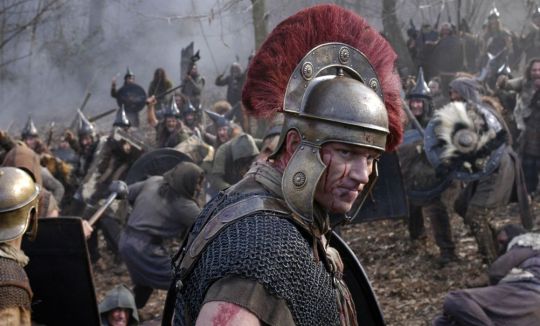
So we are left with the disturbing question: were the stressors really the same?
This is the part where I also defer to my eldest sister as a doctor and surgeon specialising in neurology and just so much smarter than myself.
My eldest sister holds the view in talking to her own American medical peers that despite similar experiences in Afghanistan and Iraq, British soldiers on average report better mental health than US soldiers.
My sister pointed out to research study done by Kings College London way back around 2015 or so that analysed 34 studies produced over a 15-year period (up to 2015) and found that overall there has been no increase in mental health issues among British personnel - with the exception of high rates of alcohol abuse among soldiers. The study was in part inspired the “significant mental health morbidity” among U.S. soldiers and reports that factors such as age and the quality of mental health programs contribute to the difference between the two nation’s servicemen and women.
She pointed out that these same studies showed that post-traumatic stress disorder afflicts roughly 2 to 5% of non-combat U.K. soldiers returning from deployment, while 7% of combat troops report PTSD. According to a General Health Questionnaire, an estimated 16 to 20% of U.K. soldiers have reported symptoms of common mental disorders, similar to the rates of the general U.K. population. In comparison, studies around the same time in 2014 showed U.S. soldiers experience PTSD at rates of 21 to 29%. The U.S. Department of Veteran Affairs estimated PTSD afflicted 11% of veterans returning from Afghanistan and 20% returning from Iraq. Major depression was reported by 14% of major soldiers according to another study commissioned by RAND corporation; roughly 7% of the general U.S. population reports similar symptoms.
It’s always tough comparing rates between countries and is not a reflection of the quality of the fighting soldier. But one finding that consistently and stubbornly refuses to go away is that over the past 20 years reported mental health problems tend to be higher among service personnel and veterans of the USA compared with the UK, Canada, Germany and Denmark.
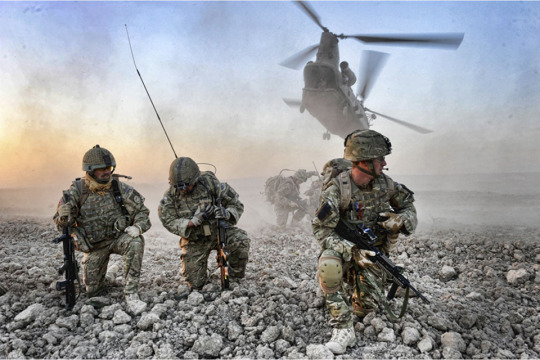
However my sister strongly cautioned against making hasty judgements. And there could be many variable factors at play. One explanation is that American soldiers are more likely than their British counterparts to be from the reserve forces. Empirical studies showed reservists from both America and British troops were more likely to experience mental illness post-deployment. It was also worth pointing out that American soldiers also tended to be younger - being younger and inexperienced as well as untested on the battlefield, service personnel would naturally run the risk of greater and be more vulnerable to mental illness.
In contrast, the elite forces of the British army, such as your brother’s Parachute Regiment or the Royal Marines, were found to be the least affected by mental illness. It was found that in spite of elite forces experiencing some of the toughest fighting conditions, they tended to enjoy better mental health than non-elite troops. The more elite a unit is or more professional then you find that troops tend to enjoy a very deep bonds of camaraderie. As such the social cohesion of these fighting forces provides a psychological protective buffer. Not for all, but for many.
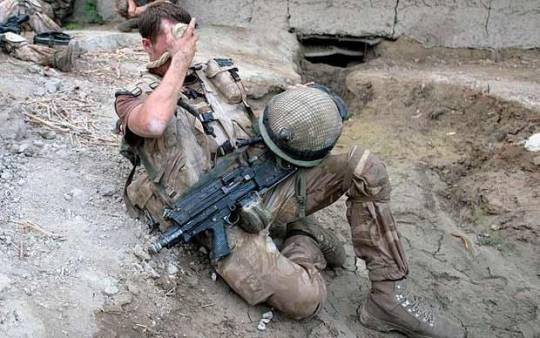
More intriguing are new avenues of discovery that might go a long way to actually understanding one of the root causes of PTSD. According to my sister, recent research carried out in the US and Europe and published in such prestigious medical journals as the New England Journal of Medicine (US) and the Lancet (UK), seems to establish a causal link between concussive injury and PTSD.
One recent study looked at US soldiers that concerned itself with the effects of concussive injuries upon troops after their return from active duty during the war in Iraq.
Of the majority of soldiers who suffered no combat injuries of any sort, 9.1 per cent exhibited symptoms consistent with PTSD. This allows a baseline for susceptibility of roughly 10% of the population. A slightly higher number (16.2%) of those who were injured in some way, but suffered no concussion, also experienced symptoms. As soon as concussive injuries were involved, however, the rates of PTSD climbed dramatically.
Although only 4.9% of the troops suffered concussions that resulted in complete loss of consciousness, 43.9% of these soldiers noted on their questionnaires that they were experiencing a range of PTSD symptoms. Of the 10.3% of the unit who suffered concussion resulting in confusion but retained consciousness, more than a quarter (27.3%) suffered symptoms. This suggests a high correlation between head trauma and the occurrence of subsequent psychological problems. The authors of the study note that ‘concern has been emerging about the possible long term effect of mild traumatic brain injury or concussion...as a result of deployment related head injuries, particularly those resulting from proximity to blast explosions’
Although these results are preliminary, if confirmed they have profound implications for anyone trying to understand the nature of warfare in the ancient world, especially the Western world.
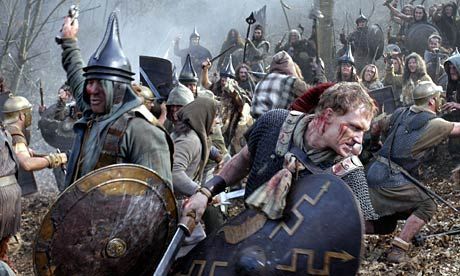
So why does it matter?
In Roman warfare, wounds were most often inflicted by edged weapons. Romans did of course experience head trauma, but the incidence of concussive injuries would have been limited both by the types of weapons they faced and by the use of helmets. Indeed the efficacy and importance of headgear for example can be deduced from the death of the Epirrote general Pyrrhus from a roof tile during the sack of Argos. It is likely that the Romans designed their helmets with an eye to blunting the force of the blows they most often encountered. Connolly has argued that helmet design in the Republican period suggests a crouching fighting stance (see P. Connolly, ‘The Roman Fighting Technique Deduced from Armour and Weaponry’, Roman Frontier Studies (1989). However my own view is that the change in helmet design may signal instead a shift in the role of troops from performing assaults on towns and fortifications when the empire was expanding (and the blows would more often rain from above) to the defence and guarding of the frontiers.
While the evidence is clear that concussion is not the only risk factor for PTSD, it is so strongly correlated that it suggests that the incidence of PTSD may have risen sharply with the arrival of modern warfare and the technology of gunpowder, shells, and plastic explosives. Indeed, accounts of shell shock from the First World War are common, and it was in the wake of that war that those observing veterans suspected that neurological damage was being caused by exploding shells.
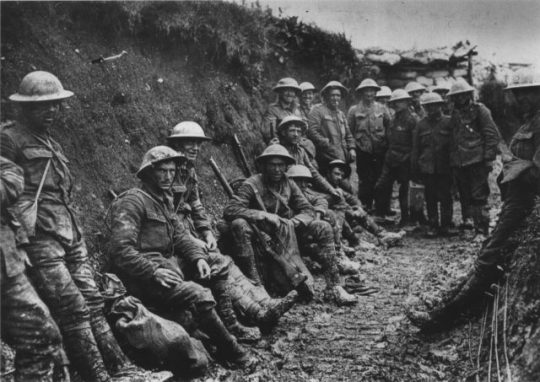
For soldiers of the Second World War and down to our modern day, an artillery barrage is like an invention of hell.
As one American put it in his memoirs of fighting the Japanese at Peleiu and Okinawa, “I developed a passionate hatred for shells. To be killed by a bullet seemed so clean and surgical but shells would not only tear and rip the body, they tortured one’s mind almost beyond the brink of sanity. After each shell I was wrung out, limp and exhausted. During prolonged shelling, I often had to restrain myself and fight back a wild inexorable urge to scream, to sob, and to cry. As Peleliu dragged on, I feared that if I ever lost control of myself under shell fire my mind would be shattered. To be under heavy shell fire was to me by far the most terrifying of combat experiences. Each time it left me feeling more forlorn and helpless, more fatalistic, and with less confidence that I could escape the dreadful law of averages that inexorably reduced our numbers. Fear is many-faceted and has many subtle nuances, but the terror and desperation endured under heavy shelling are by far the most unbearable” (see E.B. Sledge, With the Old Breed at Peleiu and Okinanwa, 2007).
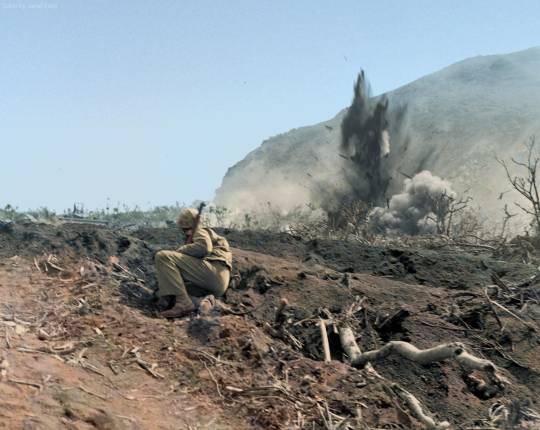
The psychological effect of shelling seems to result from the combined effect of awaiting injury while at the same time having no power to combat it.
There is another aspect that I alluded to above which is the psychological and societal conditioning of the Roman soldier. In other words a Roman male’s social and cultural expectations of his place in the world. Feelings of helplessness and fatalism were probably a less alien experience for most Romans – even those in the upper classes. In general, the Romans inhabited a world that was significantly more brutal and uncertain than our own.
This another way of saying that the Roman and 21st century combat are very different in a variety of ways that subject the modern soldier to a good deal more stress than the legionary was ever likely to suffer. And the Roman’s societal preparation – his life before the battle – was far more robust than that we enjoy today.
Take infant mortality. In the modern developed world, our infant mortality rates are about ten per thousand. In Rome, it is estimated that this number was three hundred per thousand. Three-tenths of infants would die within the first year, and an additional fifth would not make it to the age of ten - 50% of children would not survive childhood. Anecdotal evidence supports these statistics: Cornelia, the mother of the Gracchi, gave birth to twelve children between 163 bc and 152 bc; all twelve survived their father’s death in 152 bc, but only three survived to adulthood. Marcus Aurelius and his wife, Faustina, had at least twelve children but only the future emperor Commodus survived.
Then look at how that child grows up. The typical Roman child would be raised in a society that readily accepted ultra-violent arena entertainment, mob justice, frequent and bloody warfare as a fact of life. This was reinforced by religious and societal encouragement to see war as natural and beneficial, open butchering of food animals, a total lack of support structures for the poor and less able.
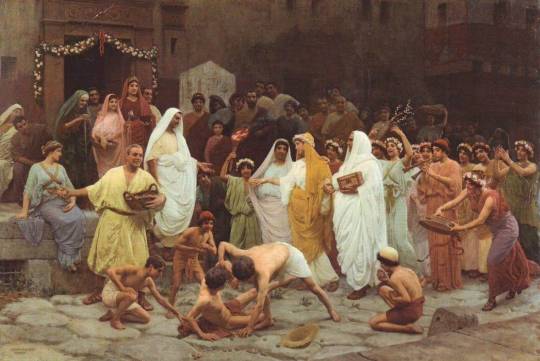
Compared to the legionary our modern soldier has been protected from such realities to a greater degree than at any other point in history, and will thus be far less well prepared for the horror of a warfare that contains far more stress factors than for a man who might fight a handful of battles in his military career, with long periods of relative calm in between, state of war notwithstanding. Modern special and elite forces training often emphasises the brutalisation and ‘rebuilding’ of the recruit in readiness for this step into darkness, but it seems likely that no such conditioning would have been needed two thousand years ago.
I would argue that we experience war very differently from the way the Romans did. Our modern identity is defined far more by our Western Christian heritage than our Western Classical roots. They are in fact world apart when it comes to ethics and morality. Consider the fact that when we talk of war and killing today we often do so through conflict between our civilian moral codes – which offer the strict injunction not to do violence to other human beings – and wartime, when men are commanded to violate such prohibitions. It is a terrible thing to try to navigate ‘Thou shalt not kill’ and the necessity of taking a life in combat.
It is sometimes the case that the qualities that make the best soldier do not make the best civilian, a point amply attested in Greek poetry by heroes such as Heracles and Odysseus.
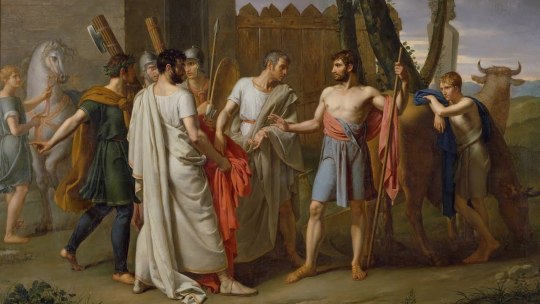
The Romans, for their part, celebrated heroes such as Cincinnatus, who could command effectively and then leave behind the power he wielded to return to his humble plough. It is important, however, when evaluating combat and its effects in the ancient world, that we do not read our ambivalence about violence onto the Romans. They inhabited an empire whose prosperity was quite openly tied to conquest.
As M. Zimmerman writes in his academic article, “Violence in Late Antiquity Reconsidered’ (2007), “The pain of the other, seen on the distorted faces of public and private monuments, or heard in the screams of criminals in the amphitheatre, reassured Romans of their own place in the world. Violence was a pervasive presence in the public space; indeed, it was an important basis for its existence, pertaining as it did not only to victories over external enemies but also to the internal order of the state.”
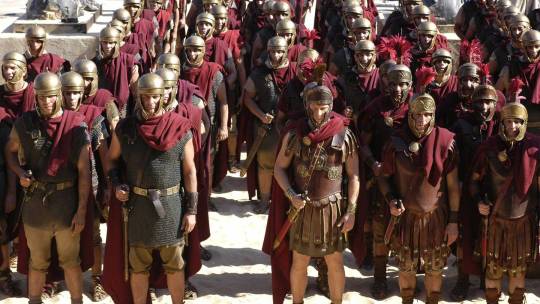
Violence then was both the means and the expression of Roman power. The Roman soldier was its instrument. The Roman warrior then would have brought a different perspective to lethal violence, and would have had a far more restricted moral circle to his modern counterpart – his friends and family, clan, patron and clients, as opposed to millions of fellow citizens via the internet and social media.
Part II follows next post
#question#ask#PTSD#war#roman#greek#classical#legionary#spartan#mental health#depression#trauma#warfare#british army#mental illness#homecoming#soldiers#combat veterans#veterans
46 notes
·
View notes
Text
United In Fear (Part One - Soulmate!Robb)
Pairing: Robb Stark x Reader; Soulmates AU (because Game of Thrones just didn’t have enough fantasy drama for me)
Word count: 7.6k
Warnings: Angsty fluff, someone get’s punched but it’s not super dramatic
Summary: The names were the greatest mystery in Westeros. Each kingdom had their own telling of the story. None of the kingdoms could agree on where they were from or how they came to be. Each thought a different god, their own interpretation of religion, was responsible, but all seemed to agree on one thing: they were a gift.
Notes: so the thing is right... I didn’t really mean to write this. It just sort of came out. Long story short. It’s an idea I had. If people like it, I’ll finish it. It will probably take 3-4 Parts to complete the story arc I have in mind. Each part about this long.

It wasn’t her banner or her looks that tipped Robb Stark off that she was (Y/n) Lannister. It was her being. The way she dismounted her horse while all of Winterfell still knelt before Robert Baratheon, as though everyone, even the King, was beneath her. The way she took her brother’s helping hand as if Lannister blood was the only thing worthy of touching her skin. The way her chin never dipped, always keeping her head up and her gaze held high. The way her feet glided over the ground with quick, sure steps that spoke of how little she wished to touch Northern soil. The way she never met the gaze of anyone, save her siblings, Robb’s father, and the King. (Y/n) Lannister could not have hidden her identity even if she tried, and she most certainly did not try.
She kept beside her brother as the King motioned for them to rise and greeted Robb’s father. Her eyes took the time to wander over the keep, and she kept her expression unreadably passive wherever they went. She made no acknowledgment that anything important was happening around her until her sister exited the carriage. (Y/n) released her brother’s arm and stepped forward to stand at the queen’s right hand.
“My queen,” Ned Stark said as he bent to kiss Cersei’s offered hand.
“My queen,” Catelyn echoed with a curtsy.
Cersei greeted both with a weary, but polite nod. “My sister,” Cersei stepped aside, positioning herself in front of Robb, and held out her hand for introductions, “(Y/n) Lannister, Lady of the Rock.”
(Y/n) offered no hand, so Ned simply bowed before her. “My lady.”
She curtsied with the air of someone who would have preferred not to move at all. “A pleasure, Lord Stark.”
“The pleasure is ours, Lady Lannister,” Catelyn greeted, repeating her curtsy.
(Y/n) returned Catelyn’s pleasantries only to be interrupted by the King. “Take me to your crypt. I want to pay my respects.”
(Y/n) and Cersei averted their gaze to Robert with matching expressions of distaste. “We’ve been riding for a month, my love. Surely the dead can wait.” Cersei’s tone was dismissive, but her expression as Robert called for Ned to step around her was nothing short of wounded.
Robb watched the sneer on (Y/n)’s face as she eyed Robert Baratheon’s retreating back. He wondered, to himself, if it was agitation at being spoken over, agitation on her sister’s behalf, or simply agitation with the state of the King. Robb wasn’t sure he would blame her with any of the three. He couldn’t recall his father ever speaking over a noblewoman of any standing, and Ned was certainly never so dismissive to Robb’s mother.
And the King. Well, the King was not at all what Robb expected from his father’s stories. He knew the man had aged some since his father had last seen him, but Robb thought he’d have aged with more dignity. He didn’t expect a belly fat with food, breath stale with wine, or a horse’s dismount that require a servant to bring the King a stool. Robert Baratheon was what Robb Stark expected of a wealthy village drunkard, not his supposedly heroic, noble namesake.
The Lannisters, for all the harsh words his father had to say about them, did not at all disappoint. The family measured up entirely to even their most fantastical tales. The Queen had aged some since the songs had named her the Light of the West, but she had aged with grace. Her beauty had changed, but Robb could say with some certainty that it hadn’t faded.
Jaime Lannister was ever the Golden Lion. A ballad of his bravery during the Greyjoy Rebellion had once been sung at a feast in Winterfell, and Ned Stark had grudgingly admitted the words to be true. The Queen’s twin was a formidable man who’s self confidence was only matched by the skill he used to justify it. All the poets had something to say or sing about Jaime Lannister. Some painted him a hero, some a villain. But all painted him the perfect image of a knight, and the man before Robb now proved them all to be right.
(Y/n) was not the subject of songs, but whispers. Tywin’s youngest child was no older than Robb himself, the product of a second marriage Tywin did not wish to make. She was rumored to be her father reincarnate. With her mother dead in the birthing bed and her siblings in King’s Landing, (Y/n) had been raised by Tywin and Tywin alone, entirely in his own image. Watching her stand in the grounds of Winterfell, Robb would say that Tywin’s quest had been a complete success. She was only a young woman, yet her presence demanded respect, and everyone gave it.
“Where’s the Imp?” Arya asked her older sister, with no attempts at hiding her words.
The words drew (Y/n)’s gaze, and for the first time, Robb watched his youngest sister cower back, afraid.
The Queen turned her head to her sister. “The little beast wandered off again.”
“I’ll find him,” (Y/n) didn’t bother to look at her sister as she addressed her. Her eyes stayed on Arya for a moment longer before she whipped around, marching back to her horse.
“My lady,” Catelyn took a step out of line after the youngest Lannister. “Perhaps, we can offer some assistance.”
Jaime Lannister responded with a chuckle as he offered (Y/n) a hand back on her horse. “Only in finding your nearest brothels.”
Catelyn Stark was thoroughly scandalized as Lady (Y/n) rode away, Ser Jaime following at her heels.
Robb sighed to himself and turned away. She hadn’t been introduced to him. He still couldn’t be sure.
-----------------------------------------------------------------------------------------------------------
The names were the greatest mystery in Westeros. Each kingdom had their own telling of the story. None of the kingdoms could agree on where they were from or how they came to be. Each thought a different god, their own interpretation of religion, was responsible, but all seemed to agree on one thing: they were a gift.
In the North, they maintained the names were a mystery of the Old Gods, a force that no man could influence or pretend to understand. The descendants of the First Men claimed the names long predated the Faith of the Seven and dated all the way back to the Children of the Forest. No proof could be found of this, but given the Andals hostile takeover of the other kingdoms, much of the First Men’s culture and history had been lost. It fell to the Starks alone to remember, and they did their job well. The North remembered.
The Reach claimed they came from the Father. They argued that if the names were given by the gods, surely they came from the Father who was Above All. They weaved a tale of a man, loyal to no god but the Seven, who came to Westeros with the invasion of the Andals. He preached and pleaded with the First Men to convert to the one true religion, and everywhere he went they rebuked him. Everywhere but Oldtown. Everyone but House Hightower. As a gift, for the conversion of Damon Hightower to the Faith of the Seven, the Father gave the names to the Reach, and thus as the faith spread so did the names across all of Westeros.
The Stormlands claimed that, in fact, the Smith, mender of broken things, was responsible for the gift. Men, whether they were Andals or First Men or Rhoynar, were harsh, imperfect creatures, and nowhere was that more true than the Stormlands. The Smith had long made it his responsibility to put their world right, and that began with fixing the men themselves. He began with Hugor of the Hill, the first King of the Andals. The Smith touched Hugor’s arm to give him the name of his wife, so she might heal the scars the world left on him and his sons might find maidens of their own to do the same.
The Warrior was, in fact, the source of the The Vale’s legends. It made sense in that The Vale was the first place invaded by the Andals. They claimed the reason the names existed in Westeros but not Essos was because the Andals had never conquered the eastern continent. Where the Andals seized land in honor of the Warrior, the Seven would bless the soldiers out of gratitude for their service. Of course, this blessing started with the Vale.
In the Crownlands, the names were said to be given by the Mother. It was said that one day she looked down on a small, forgotten sept in the Crownlands and saw one of her devout, a young married woman, crying at her altar. The young woman had been married for two years and had yet to fall pregnant with her husband. He was an angry, cruel man, threatening to disavow her and name her barren if she did not give him a child within the year. The woman called out for the Mother’s mercy, for a child she could not have, and the Mother heard her cries. She wanted happiness for her good and faithful servant and knew she would not attain it with such a man. Reaching down, the Mother touched the woman’s arm, and a man’s name appeared, a name that was not her husband’s. Many years later, Baelor the Blessed would visit every sept in the Crownlands, looking for the place where the Mother gave the names, and when he sensed he had found it, he built up around that sept the Great Sept of Baelor, a sept worthy of the gift the Mother had given to man that day.
The Westerlands cited scripture. It was written in the Seven Pointed Star that Hugor of the Hill received a blessing from each of the Gods, and when it came to the Maid, she gave Hugor a maiden of his own, a wife of great beauty and innocence. The Westerlands maintained this must mean she gave the names; it was the Maiden’s way of giving the gift of love to every true believer in the Seven.
The Crone belonged to the Riverlands, in more ways than one. To the Lords and Ladies of the Riverlands, the Crone was held in the highest esteem. The names were without fault or failure. How could anyone think the wisdom of age, that only came from the old woman, was not involved? They told a lovely story of the Crone looking on the youth of the Maiden with sympathy for her ignorance. Longing to spare her from making the same mistakes the Crone had learned from in her youth, the Crone spared her the search for a man who truly loved her by pointing her in the right direction.
Dorne had the simplest explanation, and they did not bother trying to justify it with tall tales or kingdom history. They said the names were a gift from the Stranger. So that no man need face Death alone. Robb liked that explanation best.
Still, he did not believe in the Stranger. He kept faith with the Old Gods. His mother had made a point that all her children at least understood the Seven and understood that, while they were the same gods everywhere, each kingdom saw them differently. Catelyn knew that Ned would have to raise them to worship at the weirwood tree, but she didn’t want her children to feel out of place if they ever joined her in the sept or journeyed in the rest of Westeros.
Robb knew all the lore, and he remembered it well. Not so well as Sansa, who longed to go South, but better than Arya who never listened no matter how many times she was told.
He would often lie awake at night staring at the name inked into his arm, wondering to himself what she thought of this. If she, like him, believed his name on her arm to be a gift from the Old Gods, beyond the understanding of man. If she thought his name was a gift from any one of the Seven for any number of reasons. Or if she was on the other side of Westeros, simply looking for a companion to her grave.
Her name was never far from his thoughts. He wondered where she was. He wondered her station. He wondered how she felt. He wondered if she wondered about him. How could she not? They were destined for each other, destined to be together, if not in this life than the next.
When he was younger, Robb had longed for her. His nurse had met her mate, a butcher from one of the smaller towns outside of Winterfell; and he longed for the love he saw in her eyes. He longed for frivolous things: someone to suffer through his lessons with, someone to ride the Wolfswood beside, someone to take some of the weight of Winterfell off his shoulders.
As he got older, he learned better than to dream of such things.
Not everyone met their match, and the odds were not in Robb’s favor. Most of Westeros lived and died without knowing whose name had mared their skin for life. There were too many people, spread out over too great a distance, over Seven Kingdoms and the Vale, and all anyone ever had to search for was their first name, their given name on their arm. Those who did find the one were usually those who were able to devote their lives to the scowering the Seven Kingdoms in their search.
Heir to Winterfell, Robb did not have the time to search for his mate. She would have to wait. He would see her in the next life. Robb would never be able to marry the girl whose name was on his arm. Even if he found her, he could not have her. There were millions of women in Westeros, and his mate would not be among the nobility.
It was an incredibly rare occurrence for nobility to be destined for each other, but it had been known to happen on occasion. Yet only once, in the millions of Westerosi, in the thousands of mates that found one another, in the hundreds of nobility that went searching, in the dozens of nobility that found their mate, and the few who found their mate to be someone of equal standing. Only once in history had two nobles found each other’s names and actually managed to be married. Two Lannisters, of all the undeserving families in the Kingdoms. As if anyone could have denied Tywin Lannister anything.
Tywin’s love for his wife, Joanna, was as legendary as his victories in battle. The Lannisters sang the Rains of Castamere at their tournaments, and the Lion and the Lady at their feasts. Every man, woman, and child in Westeros knew the words to both.
Tywin loved Joanna deeply, unconditionally, and once they touched, no one could keep him from taking her as his own. They shared a bond deeper than their lives and deeper than her death.
No one knew a greater love than Tywin, and no one knew a greater loss.
Aerys Targaryen could have gotten away with all his burnings, all his cruelties, all his madness; bare one. Bare the day of the Tourney at Harrenhal when he declared the end of Tywin’s mourning, when he stole Tywin’s son and declared before all the Seven Kingdoms the Hand of the King would remarry.
The stories said that was the day the Targaryens lost the war: long before it even started. Of course, Rhaegar snubbed his wife, Elia, in front of Prince Oberyn. Yes, he kidnapped Lyanna Stark from under Robert Baratheon’s nose. Sure, Aerys did give away the woman Ned Stark was pursuing. But more than all of that, it was the day the Targaryens crossed Tywin Lannister, and there was one certainty about Tywin Lannister. Those who crossed him only got to do so once.
Any other man in the Seven would have been thrilled, relieved even, to marry Ashara Dayne. Tywin Lannister simply looked on the girl and walked away.
It was common knowledge that Tywin only ever touched his second wife twice: once to hold her hand to complete the wedding ceremony and once during the bedding. The maids who came to collect the sheets the next morning swore they heard Tywin cry, but that could have just been a rumor. Neither maid was seen or heard from in any noble house in Westeros again to confirm or deny.
It was likely for the best that Ashara died giving birth to her only child. It spared her a lifetime of living in the shadow of a ghost. It spared her the pain of watching her daughter, (Y/n), twisted into the spitting image of her father.
Robb had heard her name once, (Y/n) Lannister, and asked his mother hopefully if that was the (Y/n) on his arm. He didn’t know her, but he hoped it was her, hoped it was someone he might actually be able to marry one day.
Catelyn had been aghast. She swore no son of hers could ever be bound to a Lannister.
-----------------------------------------------------------------------------------------------------------
“My lady,” A knock came on the chamber door. “The feast is prepared, and the guests are assembling downstairs.”
(Y/n) threw the door open and leaned against the thick wood frame as she crossed her arms over her chest with a mischievous smirk. “My lady? Since when did you use such formalities?”
Jaime stood on the other side of the door, looking as golden and perfect in his armor as always. His lips were pulled wide in a smirk matching his little sister;s, the one he’d spent years teaching her on their father’s occasional trips with her to King’s Landing. “Well, when you are in the presence of the acting Lady of the Rock, one must always keep one’s guard up.” He extended his arm to her, “Shall I escort you?”
“I suppose that wouldn’t be entirely disagreeable,” She mused, lifting her golden skirts with one hand and accepting her brother’s help with the other. “Tell me, do you think Tyrion will grace us with his presence this evening?”
Jaime snorted as he pulled the door to (Y/n)’s room shut and led her down the hall. “Doubtful, though I could be persuaded to hunt him down if you or Cersei wished.”
“Cersei never wishes,” (Y/n) rolled her eyes.
She and Cersei had a mutual understanding that was heavily dependent on both sisters keeping their distance. Of her siblings, (Y/n) was closest to Tyrion, but she wasn’t about to get in a fight with Cersei over forcing his attendance at a meager Northern feast.
“But you always do.” Jaime said it like he was reminding her of something profound rather than her own opinion.
Jaime let go of her hand and descended the narrow, winding steps to the ground floor, staying one step ahead of her so he might catch her if she slipped. He knew it was an unnecessary precaution. (Y/n) never slipped, in actions or in words. It still made him feel better to know he could catch her if he needed.
“Because I love our brother dearly, Jaime, as do you.”
“Cersei loves him in her own way.” Jaime tried to placate.
(Y/n) only scoffed. “You always were a terrible liar.”
With a chuckle, he took her hand and helped her off the final step back onto the solid stone of one of Winterfell’s many long, dark halls. “You and I both know that’s not true. I can get away with lying to anyone I’m not related to. It’s only you three and father who ever really caught me in a lie.”
“Yes, but I believe I deserve greater credit than the others. They have far more experience; I missed all of your childhood antics. All I have are Tyrion’s stories and father’s criticisms to keep me company at the Rock.”
Jaime nodded in agreement. “The Rock can be quite lonely. Cersei and I only had each other for a long while.”
(Y/n) looked around for a quick moment before she dragged her brother back by his arm. Her eyes searched the stone in both directions to ensure no one was watching before she pulled him into a narrow walk off the main passage.
“Jaime,” her tone was a quiet, harsh warning.
Not for the first time since they’d started the journey North, Jaime heard his father in her voice. It always amazed him. He wondered if she knew she was doing, or if it came to her naturally.
“Do not do this here.” (Y/n) pressed.
“Do not do what, sister?”
Her head cocked to the side, eyes judging his every word. It was the way Tywin looked at advisors who spoke out of turn. “You know what. You and Cersei hide nothing from me. I remain silent out of respect for you, but don’t mistake my silence as approval of your behavior.”
The muscles in Jaime’s jaw tightened. A tell that he was about to lie. “I don’t know what you’re…”
She cut him off before he could finish. “Do not play games with me, Jaime. I am not Tyrion, too drunk to care; and I am not father who does not see what he does not want to see. I see you Jaime.”
“Sister, what exactly is the point of this conversation?” He wouldn’t bother denying it again. If the first denial didn’t put (Y/n) off, it meant she would not be dissuaded.
“My point?” She went on her toes and looked over his shoulder. Her voice was quiet enough not to bounce off the stone, and the walls shielded them from most prying eyes. Yet that did nothing to quiet her concern. “My point is that I will not have you risking this family, Jaime.”
“You think so little of me, sister?”
“Yes.” It was a blunt answer. An honest answer. “Jaime, unlike our siblings, I do not think you foolish, but I do think you arrogant. You know the consequences of being caught. You’re just far too confident that you won’t be.”
Jaime sighed and ran a hand through his hair. (Y/n) was impossible to argue with. Part of it was her mind. Jaime always joked she had inherited the portion meant for him. A greater part was their father. (Y/n) had a way of saying the things he knew Tywin would, but with a touch more caring that made him actually want to listen.
(Y/n) took the pause as opportunity. “Listen to me, Jaime. I know what you’re thinking, brother. You think, even if caught, there will be no consequences for your actions, because there never have been before. You know what the consequences should be, but you don’t think they apply to you. If you got caught in Casterly Rock, the servants would die with your secret, whether they kept it till old age or were hung from the gallows by father. If you got caught in King’s Landing, there would be whispers. Yet, no one would be foolhardy enough to question you of them, or Maester Pycelle would poison them by dinner.”
She growled, dragging his face down to her level by the collar of his breastplate. (Y/n) needed him to listen to her. “This is not Casterly Rock, Jaime, nor is it King’s Landing. This is the North. You are in the enemy’s camp, and your name will not protect you.”
Jaime measured his sister’s words carefully. “If it would make you happy, sister, then nothing will happen while we are under Ned Stark’s roof.”
“I would be utterly relieved, if I actually believed you.” Her tone was short, but Jaime could tell she was hopeful.
“All will be above reproach,” he offered her his arm again. “You have my word.”
(Y/n) accepted with a wary expression but allowed him to pull her back into the hall and west towards the feast. She could hear it now. There was raucous laughter and loud music filling the air.
“Lady Lannister,” Three more long hallways, and Jaime presented his sister to the Lady of Winterfell, Catelyn Stark.
“Lady Stark,” (Y/n) curtsied with an elegant twist of her hand. “Judging by the sounds, this will be quite the feast.”
“Indeed,” Catelyn’s smile was warm but not at all inviting. There was a distance to the woman as she stood awkwardly in front of her.
(Y/n) bit back a smirk. Catelyn Stark was smart. Distrusting a Lannister was usually the right idea. “It’s not every day the King makes the long journey north. I’m sure they are excited to be part of such a grand occasion.”
“Made grander by your presence, dear sister.” Jaime had gone to retrieve Cersei.
“My queen, I doubt you need me to accomplish such a task.” (Y/n) gave Cersei a friendly smile. “You are, after all, the Queen of Westeros. What could I possibly add?”
The formality of the conversation between the siblings visibly disconcerted Catelyn. She couldn’t tell what was heartfelt and what was show. Catelyn was caught in a conversation with three Lannister, unable to speak but unable to leave.
“Too gracious of you, sister.” Cersei deferred away. “Jaime retrieved me from my conversation with our host because I hoped to ask you a favor.”
(Y/n) shot her gaze after Ned Stark at the other end of the hall. She would ask about the discussion later; they both knew that. “Do share, my queen. If it is within my power, I will happily oblige.”
Cersei touched a gentle hand to Catelyn’s shoulder, dragging her, unwanted, back into the fold. “Robb Stark, your dear boy,” the Queen smiled to Catelyn, “is the male heir of greatest standing and is duty bound to escort my sweet Myrcella to the feast this evening.”
“That he is,” Catelyn wasn’t sure the explanation was meant for her. It would be far greater offense to ignore than to interrupt.
“It,” the Queen paused as though looking for the right word, but (Y/n) knew whatever was to come Cersei had practiced down to the last pause, “unsettles me.” She seemed to finally choose the word. “He’s an honorable man. I’m certain of that. Still, he’s a man nonetheless, and Myrcella is so young. As a mother of daughters, I am sure you can understand my hesitation.”
Catelyn didn’t, but she acquised. “Of course, my queen. What would you propose?”
“If my sister and your son will agree,” Cersei turned to (Y/n), as if she had a choice in the matter, “I would ask that Myrcella walk with your lovely boy Bran, while Robb escorts (Y/n).”
(Y/n) nodded, “Of course, my queen. If it would ease your mind.”
Catelyn stepped back from Cersei, removing the Lannister’s hand from her shoulder. “I will speak with my son for you, my queen,” She curtsied as she backed away towards the other end of the entryway, where her sons congregated with their father, Robert, and the Baratheon boys.
“Well that went well,” Jaime snorted as he watched Catelyn’s hasty retreat.
“She’s scared,” Cersei rolled her eyes after the older woman.
“She hides it well, though,” (Y/n) offered a subtle agreement. “Do you actually wish me and Myrcella to switch? Or were you just looking to unnerve her?”
When her face turned back to the safety of her siblings, Cersei’s lip curled into a sneer. “I have no intention of that Northmen touching my Myrcella. Robert already means to give my Joff to that wench, Sansa, but at least he’ll be able to stay with me. I won’t have Robert abandoning my sweet girl all alone up here in this waste. That man and this so-called castle aren’t worthy of her.”
“Voices down, sister,” (Y/n) warned with little concern actually seeping through to her tone. “I’ll walk with the Stark. No one will leave Myrcella in the cold.”
“Woman!” Robert’s voice boomed.
(Y/n) caught only a glimpse of Cersei as she turned. The twins truly did share everything. Cersei’s jaw clenched before she lied, as well. “Yes, my love?” It wasn’t a terribly good lie either.
“It’s time to feast. Walk with Ned.”
(Y/n) watched her sister’s hung head approach Ned Stark. If she was a fool, as Robert Baratheon most assuredly was, she would think Cersei humbled, but (Y/n) was no fool.
“My lady.”
(Y/n)’s hair whipped at her cheek, turning her head far too quickly for her to hide that she was anything but surprised by the voice. She hadn’t heard Robb Stark approach, nor had she expected to hear his voice. It wasn’t often that anyone caught her by surprise.
“Yes, my lord.”
“I was told by my mother that I am to escort you.” Robb offered her his hand with a bow. “Unless, of course, you would prefer the company of Rickon.” His smile was teasing but genuine. It was a refreshing change of pace.
“Do not tempt me,” She smiled politely in return. “He is a charmingly adorable child.”
Her hand reached out to accept his, only for his whole body to jerk back the second their fingers brushed.
She couldn’t deny she felt it to.
(Y/n) had long forgotten about the writing on her arm. It was an irritation she had to conceal behind her sleeves, nothing more.
Peasants had a habit of naming their children after their liege lords and other powerful men in Westeros. After Robert became King, Robb proved to be an incredibly common name throughout the Seven Kingdoms.
Not that that would have stopped her. If she truly wanted, she could have offered a gold dragon as reward for every ‘Robb’ in Westeros that came to the Rock to touch her hand. She could have sent the Mountain through the lands to find every man with (Y/n) still written on his arm. She could have snuck away in the dead of night with some knights who preferred her to her father and traveled the Seven Kingdoms in her search. She could have walked the twenty paces from her chambers to the sept and prayed to any of the Seven to put Robb in her path.
Instead, she did nothing. Because, in truth, she had never considered searching for him. (Y/n) didn’t want to meet Robb.
Whatever god was responsible for the names was clearly not listening to her wants.
A burning sensation raced across her arm where she knew Robb’s name to be. She knew what was happening. She’d seen the scars on her father’s skin.
At the first touch, the ink in the skin burned away. It left a mark like the brand of an iron. The scars left behind once it healed would form a mate’s family name.
In a few day’s time, Robb’s arm would read ‘Lannister’, and (Y/n) would forever be signed with the name ‘Stark’.
She always knew finding her mate would be a very bad thing, but this was worse than she’d imagined.
(Y/n)’s aloof mask remained in place, completely ignoring the pain in her arm and Robb’s reaction. “Shall we, Lord Stark?”
Robb was frozen for several long moments in utter confusion. This was obviously not what he’d expected. Taking her hand, utterly baffled by her response, Robb led (Y/n) into the feast as though nothing had transpired.
---------------------------------------------------------------------------------------------------------
A knock to her door woke (Y/n) early the next morning.
“Jaime, if that’s you again, I swear I’ll tell father about accidentally dumping his prized chest in the ocean.” (Y/n) groaned loud enough for whoever was on the other side to hear.
“Now, now, sister,” Jaime didn’t wait for any further invitation and slipped her door only just wide enough to step inside before he slammed it shut. “I’m here by orders of our King.”
(Y/n) rolled out from beneath the furs. “Oh, what could that oaf ever want with me?” She quickly slipped behind her changing screen to put on the dress her maid had left hung over the top of the divider.
“The King asked for you, but I don’t think it was by his own design.”
“Of course it wasn’t. Why would he ever wish to talk to any woman who could think?” (Y/n) quelled her laugh to a soft chuckle. “Help me with these laces,” she came to stand braced against her bed.
Jaime groaned but approached without hesitation, “Sister, you have handmaidens for this. Do you not? Has father so deprived you in my absence?”
(Y/n) commented snidely over her shoulder. “You’re telling me you’ve not helped our sister in more precarious positions than this?”
Jaime gripped the laces and jerked them tight around her body, knocking the wind out of her. “That,” He began to lace her corset back the rest of the way up, “was cheap, even from you.”
She hummed in agreement. “Perhaps it was, but we’re all allowed our days. Yours come once a moon. Tyrion’s come on any day you refuse to let him drink. Cersei’s on any day she has to pretend to enjoy Robert’s company.” (Y/n) twisted to face Jaime with a grin, “Father’s on any day the sun dares to rise.”
Jaime chuckled at that. “And what, dear sister,” he asks as he opens her door, “has you so downtrodden?”
She simply shook her head. “Not for your ears, Jaime. At least, not till I figure out what to say.”
Jaime frowned. “You know, I’m not half as smart as you or Tyrion, but I’m a far better listener. You can always come to me, even if you don’t know what to say.”
“Of course, Jaime.” (Y/n) doubted many things, but she never doubted that.
Their walk to Robert’s chambers passed in comfortable silence. (Y/n) had far too much to contemplate to maintain a conversation, and Jaime knew his sister well enough not to disturb her.
His knock on Robert’s door seemed to be the only thing to wake her from her own mind.
“Enter,” came the King’s voice from inside.
Jaime opened the door for his sister and froze when he saw the contents of the room. The King sat at the desk in the corner with Ned Stark leaned against the wall nearby. Catelyn Stark occupied the chair in the corner, and her eldest son stood at her side.
“My King, the Lady (Y/n) Lannister.” Jaime announced his sister as she stepped through after him.
As usual, (Y/n)’s expression gave nothing away. It was as if she was entirely unsurprised by this gathering. “My King, my lords, my lady,” (Y/n) dipped in acknowledgment of those in the room.
“Leave us, Kingslayer.” Robert spat to Jaime, ignoring (Y/n) as though she hadn’t spoke.
Jaime hesitated. For the first time in a long time, he considered disobeying his king. Jaime didn’t know where this was going, but he didn’t want to leave his sister to face them alone.
“Thank you, Ser Jaime,” (Y/n) only said the words as reason to turn to her brother. Her eyes flicked towards the door, a warning for Jaime to leave.
“Your Grace,” Jaime bowed and took the exit. It was Boros Blount’s turn to stand guard at the King’s door, but a glare at the man and a wave of Jaime’s wrist were all it took to send the knight off down the hall. Jaime trusted his sister in these situations, but he did not trust the rest of the room.
“How may I be of service?” (Y/n) asked as the door clanged shut behind her.
Without getting up, Robert managed to turn his chair with a loud scrape against the floor. “You know damn well how. Show us your arm, girl.”
Every eye in the room was on her, and she could read them all. Robert’s impatient agitation; Robb’s deep confusion; Ned’s sanctimonious disappointment; Catelyn’s misplaced rage. She was a lioness alone, and she was surrounded by the wolf pack.
“I see you’ve spoken to your son,” Her eyes rested on Catelyn’s as she jerked her sleeve, unceremoniously, up her arm. “He was not wrong,” (Y/n) showed the room the fresh burn on her arm that was already healing to form the word ‘Stark’.
“Damnit Ned.” That seemed to be a common saying of the King’s when he was in the presence of Starks.
“Well,” Catelyn huffed, turning on her husband and Robert, “What do we plan to do about this?”
(Y/n) honestly wondered how the woman managed to get a word out. If (Y/n) crossed her arms so tightly over her chest, she would hardly be able to breath, let alone form a coherent thought.
Robert forced himself from his chair with a sigh. It was before midday, and there had been a feast the previous night. This was far too early for the King to be awake, much less officiating important discussion. “What can we do? It’s a sign from the gods. We can’t ignore it.”
Catelyn was utterly fuming. Her son, her Robb, joined forever to a Lannister. She would not stand for such a thing.
“Forgive me, Your Grace,” (Y/n) cut in before Catelyn could burst, “But it sounds to me as though you’re implying I wed Robb Stark.”
Robert snorted out a laugh. “Gods, and here I thought you were one of the smart ones. Turns out you’re as slow as Lancel.” Robert crossed the room and clapped his namesake on the shoulder, pulling the Stark boy into the conversation. “Of course that’s what I mean. Ned raised his sons well. Robb’s a good, strong man, and the heir to Winterfell. You’d be lucky to have him at your side.”
“I’m sure you are correct, my King, but that doesn’t change the fact that I have no intention of marrying Robb Stark.”
Silence.
(Y/n) thought, if she listened carefully, she would be able to hear the breaths of the Kingsguard stationed outside.
Of the rare occasions that nobility were found to be mates and did not marry, there had always been something keeping them apart. Never had it been because one openly refused the other. Why would anyone, noble or otherwise, refuse their perfect match put on this earth by the gods themselves?
“Forgive me,” (Y/n) spoke slowly. She was alone on shaky ground, and she desperately needed to keep the King’s anger in check, “but my hand is my father’s to give away as he sees fit. No one else’s.”
“You would stand against the wishes of your king.”
(Y/n) immediately refuted Robert’s words. “I would stand with the wishes of my family. Wherever that may lead me.”
“You will do as your king commands.” Robert’s hand slipped from Robb’s shoulder, and he took a step towards (Y/n) Lannister.
(Y/n) didn’t bat an eye. “After my father agrees,” was the most she would concede, knowing full well it would take more than a miracle from the Seven to get Tywin Lannister to send her to Winterfell.
“You think your father would refute a match to the future Warden of the North? You Lannisters think yourselves that much better than the rest of us. Don’t you?” Robert stood close enough that flecks of his spit landed on her cheek.
(Y/n) wiped them away with her sleeve and a completely blank expression. “I think nothing, my King. I think I should wait for my father’s approval before I agree to things such as this.”
“Robert, the girl is right,” Ned took a step toward his old friend, but Robert raised his hand in warning, causing the Stark to freeze.
He left his hand in the air in case anyone else dared to interrupt them. “I have had it with you Lannisters. I rule Westeros. I am your King, not Tywin Lannister.”
(Y/n)’s eyes narrowed. She had had it with the King as much as he’d had it with her. Her father didn’t hold the title King of Westeros, but he held all the power of one, more than one if that one was Robert Baratheon. She was more than capable of playing the game, of placating men like Robert. But she was every bit her father’s daughter. She did not stand insults in silence.
Robert saw (Y/n) open her mouth, but all he heard was Tywin Lannister as she said, “Any man who must say, I am the King, is no true King.”
A loud snap echoed through the room, followed by a crack.
Robert Baratheon stood, looking down on his handiwork.
(Y/n) Lannister laid sprawled out on the floor with the force of a hard punch to her jaw that no one had seen coming. For a man well past his prime, Robert Baratheon could still manage all the force in his fists that his hammer had made famous during the Rebellion. The blow had knocked the girl down before anyone could think to stop him, before Ned could pull him back, before she could raise a hand in defense, before she could take a step back to brace.
For years, Robert had dreamed of doing exactly that to Tywin Lannister. Dreamed of knocking the old man back down where he belonged. Dreamed of standing with the Lord of Casterly Rock at his feet. Dreamed of watching the arrogant man bleed the same red as his banners.
This girl, (Y/n), she wasn’t Tywin Lannister. She sounded like her father. She acted like her father. But when Robert looked down at her, he only saw a girl. He had punched a young girl for nothing more than speaking to him.
If he had punched the real Tywin Lannister, he would have lost the offending hand by now. Instead, in his fury, he’d punched the Lannister’s young daughter. He still might lose his hand. The girl was a lion, through and through. She had claws, and one of them was standing right outside.
Another was, apparently, behind him.
Robb Stark pushed the King’s shoulder in his hurry to check the girl. “(Y/n), are you hurt?” The Stark boy took both of her hands in his, helping her as gently as he could, to her feet.
“I will be fine,” (Y/n) slowly brushed down her skirts and gave a smile clearly only meant for Robb. “Thank you.”
“I should take you to the Maester.” Robb clearly meant it to be an offer, but it came out more as an order.
(Y/n)’s shoulder had caught her as she fell, keeping her head from the floor; but the crack as she hit the stone was still a sickening sound. It would echo in the room for years.
Every time Robb saw his mate, he would see the King throwing her to the floor, and remember that he didn’t stop Robert in time. Ned would never be able to speak of Robert as an honorable man again; down in the crypts, he would thank the gods Lyanna hadn’t lived to be his. Catelyn would pause every time she made to speak ill of a Lannister; she would remember Robb helping (Y/n) to her feet. She would remember (Y/n)’s response.
“Thank you, Robb, but I think I’d like my brother.” (Y/n) turned to the door and called out, loud enough to be heard on the other side, “Jaime!”
The door swung open in a second. Jaime had been waiting, ear close to the door, for any word that he could enter the room. His hand rested on the hilt of his sword, and his eyes darted around the room for what had made the earlier noise.
A bruise was already flowering on (Y/n)’s face, and her dress was pulled askew off her shoulder.
“Would you be so kind as to escort me to the Maester���s?”
Jaime marched forward and caught his sister’s chin, tilting it up and away that he might examine the mark. “Is your maester a good healer, Lord Stark?” Rage dripped from Jaime’s every word, but he did not dare to ask how his sister was hurt. He already knew the answer, and it was one he could not stand to think on for long.
“That won’t be necessary, Jaime.” (Y/n) brushed his hand away and met his gaze. “I’m quite fine. I only need to send a raven.”
“For what purpose?”
How Robert Baratheon had worked up the nerve to question the woman he’d just injured was a mystery to even his oldest friend, but (Y/n) seemed unphased.
She turned to the King, smirking through her pain, “The North truly is beautiful, and I really do think father would appreciate seeing it before winter comes.”
“You-You will do no such thing.” It wasn’t fear in Robert’s voice. Ned was sure of that, but he thought it might have been defeat.
“Oh, I assure you I will.” (Y/n) grabbed her brother’s free hand, leaving the other in a death grip on his sword. The Kingslayer followed her without complaint, walking backwards to keep his eye on the King until they reached the door. “It’s high time Tywin Lannister sees Winterfell. Or do I need to remind you what truly unites the Seven Kingdoms, Robert Baratheon? Because we both know, it’s not your throne.”
-----------------------------------------------------------------------------------------------------------
Next Time On... Part Two
GoT Taglist:
@everythngiwant / @maybe-a-fangurl /
#robb stark#robb stark x reader#game of thrones fanfiction#game of thrones fanfic#game of thrones au#soulmates au#soulmate au#got fanfiction#got fanfic#robb stark fanfic#robb stark fanfiction#robb stark imagine#game of thrones imagine#got imagine#robb stark x you#robb stark x y/n#robb stark angst#robb stark fluff#robb stark au
2K notes
·
View notes
Text
Let's get personal:
• 6 of the songs you listen to most?
You’ll Be Back (Hamilton), Car Radio (TØP Vessel), Soldier Poet King (The Oh Hellos), IDK You Yet (Alexander 23), Lemons (Brye), S.L.U.T (Bea Miller)
• If you could meet anyone on this earth, who would it be?
Thomas Sanders
• Grab the book nearest to you, turn to page 23, give me line 17.
"Her smile faded, her chest tightened, and heavy blanket of anguis smothered her smallest joy."
• What do you think about most?
Whether or not the world exists
• What does your latest text message from someone else say?
Goodnight
• Do you sleep with or without clothes on?
With
• What's your strangest talent?
Uhm, I can identify any bird based on a picture (not that great a talent)
• Girls... (finish the sentence) Boys... (finish the sentence)
Girls are handsome. Boys are beautiful.
• Ever had a poem or song written about you?
Not that I know of
• When was the last time you played the air guitar?
Earlier tonight (i was listening to the phineas and ferb theme song)
• Do you have any strange phobias?
Agoraphobia (fear or large spaces/rooms, I always hated gym class)
• Ever stuck a foreign object up your nose?
One of those round flat LEGO dots
• What's your religion
I don't have one specific, though I lean towards a philosophy known as the Dao De Jing
• If you are outside, what are you most likely doing?
Birding
• Do you prefer to be behind the camera or in front of it?
Behind.
• Simple but extremely complex. Favorite band?
Twenty Øne Pilots
• What was the last lie you told?
That I practiced piano
• Do you believe in karma?
It depends.
• What does your URL mean?
Pidgeon refers to Pidge Gunderson from Voltron Legendary Defender, 11206 is my favorite number
• What is your greatest weakness and strength?
Weakness - Emotions Strength - Music/Art/Writing
• Who is your celebrity crush?
Bex Taylor-Klaus
• Have you ever gone skinny-dipping?
No
• How do you vent your anger?
Writing angst
• Do you have a collection of anything?
Tiny screwdrivers
• Do you prefer talking on the phone or video chatting online?
Honestly it doesn't really matter. As long as I'm able to talk to them and hear them, I'm good.
• Are you happy with the person you've become?
More or less.
• What's a sound you hate vs a sound you love?
Hate - hail on my window or roof Love - pencil tapping
• What's your biggest "what if"?
What if the world as we know it doesn't exist and we are all living an illusion surrounded by other illusions that act as if they understand reality?
"I think, therefore I am."
• Do you believe in ghosts? What about aliens?
Ghosts, more or less. Aliens, absolutely. There is a vast and ever growing space beyond our knowledge, there is no way we're the only planet capable of harboring life.
• Stick your right arm out. What do you feel first? The same with your left arm.
Right - my nightstand Left - my wall
• Smell the air. What do you smell?
My dogs
• What's the worst place you have ever been to?
A mental hospital, visiting a family member. (No, it wasn't an insane asylum, this family member was dealing with suicidal thoughts and tendencies.)
• Choose - East or West coast?
East.
• Most attractive singer of your opposite gender?
I am all genders and none, but of my opposite sex would be Shawn Mendes
• To you, what is the meaning of life?
There is none. You wake up, do things daily, go to sleep, and repeat until you die. You aren't meant to do things differently, some people are just considered better than others and actually make an impact.
• Define Art.
A way for others to interpret an individual's self expression
• Do you believe in luck?
Yes. The universe doesn't treat people the same all the time.
• What's the weather like right now?
It's storming outside, lots of thunder and lightning and rain.
• What time is it?
At the time of writing this question, 12:10 am
• Do you drive? If so, have you ever crashed?
No, I don't drive.
• What was the last book you read?
"The Mysterious Benedict Society"
• Do you like the smell of gasoline?
Absolutely not.
• Do you have any nicknames?
One of my friends refers to me as Remus because I remind her of Remus from Sanders Sides
• What was the last film you saw?
"After The Dark" otherwise known as "The Philisphers"
• What's the worst injury you've had?
Between spraining my wrist and getting a two inch split on my scalp
• Have you ever caught a butterfly?
No, but I have held one and walked with it without it flying away
• Do you have any obsessions right now?
Chemical Engineering, learning Italian, Philosophy
• What's your sexual orientation?
Asexual - Panromantic
• Ever had a rumor spread about you?
Yes
• Do you believe in magic?
Not really, no (but I do believe in the paranormal)
• Do you tend to hold grudges against people who have done you wrong?
The only person I know has done me wrong gaslighted me and made me believe it was my fault, so no
• What's your astrological sign?
Aquarius
• Do you save money or spend it?
Depends on if we're talking about video games or real life
• What's the last thing you purchased?
Starbucks White Chocolate Mocha
• Love or Lust?
Lust is fake. I will always and forever choose love
• In a relationship?
Nope
• How many relationships have you had?
Four
• Can you touch your nose with your tongue?
No
• Where were you yesterday?
At home
• Is there anything pink within 10 feet of you?
An old toy vault that I got at a book fair
• Are you wearing socks right now?
No
• What's your favorite animal?
It's between a lion, a snake, or a coral polyp
• What is your secret weapon to get someone to like you?
Use a super cheesy dad joke, it always makes everyone laugh
• Where is your best friend?
At home
• Give me your top five favorite blogs on Tumblr
Idk I don't really follow any blogs
• What is your heritage?
Italian, Danish, Norwegian, English
• What were you doing last night at 12:00 am?
Writing fanfiction
• What do you think is Satan's last name?
Grovum (don't ask me why)
• Be honest. Ever gotten yourself off?
I tried, I hated it
• Are you the kind of friend you want to have as a friend?
Not really, no
• You are walking down the street on your way to work. There is a dog drowning in the canal on the side of the street. Your boss told you that if you are late on more time, you get fired. What do you do?
If I'm late all the time, it means I don't wanna be there. I'll search for my dream job, but right now there is an innocent life at stake and I can do something about it.
• You are at the doctor's office and she has just informed you that you have one month to live. a) Do you tell anyone/everyone that you're going to die? b) What do you do with your remaining days? c) Would you be afraid?
a) I tell my closest family and friends. I want them to be there for me, but if I tell anyone I'm not close with, they will only pity me.
b) I will spend the rest of my time eating chocolate, drinking coffee like it's soup, and blending waffles, because doing something weird is doing something fun.
c) Not at all. Death is an inevitable concept. I would be sad, I would be angry, but I would not be afraid. There isn't a point to being scared of something you can't avoid.
• You can only have one of these things; trust or love.
I choose love. Living life without loving another person, whether it be romantic, platonic, or familial, would be torture. And for me, love is the same as trust, but trust is not the same as love.
• What's a song that always makes you happy when you hear it?
"Sincerely Me" from Dear Evan Hansen
• What are the last four digits of your cell phone number?
9286
• In your opinion, what makes a great relationship?
Equality.
• How can I win your heart?
Chocolate, a Ferris wheel ride at night, and accepting my sexual orientation.
• Can insanity have more creativity?
No. Creativity is always in the back of your mind. The same is with darker creativity. Insanity just brings it to the forefront or makes you act on it.
• What is the single best decision you have made in your life?
I decided that self harm doesn't help. I'm glad I did, or I could have landed myself in a hospital.
• What size shoes do you wear?
8 1/2
• What quote would be written on your tombstone?
"Life is a locked door. Death is the key.
Death is a locked door. Life is the key."
• What is your favorite word?
Infinitesimal
• Give me the first thing that comes to mind when you hear the word heart.
Red mixed with black and white.
• What is a saying you say a lot?
What can you do when you live in a shoe
• What is the last song you listened to?
"Heavydirtysoul"
• Basic question, what is your favorite color?
Green
• What is your current desktop picture?
Hogwarts castle
• If you could press one button and make anyone in the world explode, who would it be?
*thinks to self* does my sleep paralysis demon count..?
• What would be a question you'd be afraid to tell the truth on?
It's not a matter of which question, it's a matter of who's asking it
• One night you wake up because you heard a noise. You turn the light on to find you are surrounded by mummies. The mummies arent really doing anything, they're just standing around your bed. What do you do?
Offer them some toilet paper, maybe they're here because the ones at the supermarket are still sold out.
• You accidentally eat some radioactive vegetables. They were good, and what's even cooler is that they grant you a superpower if your choice. What is that power?
Shapeshifting
• You can re-live any point in time in your life. The time-span can only be a half-hour, though. What half hour experience would you like to experience again?
My first time watching the first scene in IT.
• You can erase any horrible experience from your past. What will it be?
Fighting with both of my best friends
• You have the opportunity to sleep with the music-celebrity of your choice. Who would it be?
None. I'm asexual.
• You just got a free plane ticket anywhere. You have to depart right now. Where are you gonna go?
Venice, Italy
• Do you have any relatives in jail?
No
• Have you ever thrown up in the car?
Yes
• Ever been on a plane
No
• If the whole word we're listening to you right now. what would you say?
F**k Donald Trump
1 note
·
View note
Text
Homosexuals Accelerated Democracy
(Skip to bottom for tl-dr)
One of the oldest known classics and pieces of Western literature, Homer's "Iliad," is one of the oldest and clearest examples of homosexual literature that not only inspired later authors to develop upon humanistic concepts of being responsible for your actions and your fate, but also paved the path towards democracy and theater.
In the story, which tells of the mortal demi-divine culture hero Achilles and his wrath, the Trojan War is in its tenth and last year (the war being fought because the Trojan prince Paris had taken the Spartan(Greek) king, Menelaus', wife Helen). Greek/Achaean commander Agememnon insults Achilles by saying that regardless of how much harder he fights for his leader, the leader's word is law, and the leader takes whatever he wants and however much he wants. Demonstrating this lack of honor, he takes Achilles' treasures of war and his concubine. Flabbergasted that even the best warrior of Greeks can be disposed of without care or concern, Achilles refuses to fight for Greeks in the last stretch of the Trojan War. Agememnon is foolish and callous and forces the Greeks into a compromising situation deep in Trojan territory. Fights occur, the gods join here and there, but Achilles is unmovable and nihilistic. He is aware, from his mother, that returning to the battlefield would assure glory and success, but wind up with his death (which, as a warrior, is what he strives for- to fight and die with honor). If he stays out, he will become rich, and live long, but be deemed a coward forever (which pains him). He wants to fight, but not for Agememnon, who tries to bribe him to work for him. He realizes that whether you're a rich king, a brave warrior, or a common farmer, death is the ultimate equalizer, so there is no point in life, except honor or legacies. Enter Patroclus- Achilles loves Patroclus and grew up with him, willing to protect him and listen to him above all else. Patroclus dons Achilles' armor to try and rout the enemy, but is ultimately killed. News of this reaches Achilles. Up to this point, his comrades and beloved friends have fought in the war, many of whom the Trojans felled, yet he did not mourn them openly. It was with the death of Patroclus that he suddenly mourns very viscerally, by pulling his hair, pouring dirt on himself and dying inside, sobbing and crumbling unto the ground next to him so as to be like the dead. Above all else, of all the people lost, of all he stood for before, of the great equalizer of death- that no longer mattered. Holding Patroclus' body, his rage towards Agememnon and the loss of his honor no longer spoke to him. He entered the war once more because he had nothing else to live for except to kill the people who had killed Patroclus, and only Patroclus. Achilles was a very cultured man, not a savage. He loved his brothers and his comrades and his heart rang out with pain seeing them fight and knowing he could not fight with them. Yet strangely it was only Patroclus that incites Achilles, not for the glory of war, but out of hatred. This wasnt to win a battle for the Greeks- he singlehandedly destroys the Trojan army and kills the Trojan prince Hector, and violently and publicly desecrates his corpse for days, out of sheer hatred for these people who took something much much more important to him than honor. His wrath was only satiated when Troy was in flames, and Hectors father, Trojan king Priam, begs on his knees to have his sons body back to be buried.
Scholars both ancient and modern have debated the meaning of Achilles sudden turn in the war in the Iliad, but the almost unanimous consensus was that Achilles and Patroclus were very much involved in a deeply romantic relationship. Homer, a poet who emphasized order and the macronarrative, didn't explicitly state the relationship of Patroclus to Achilles. His style was more focused on the consequences of Achilles enraged. He uses the micronarrative (Achilles focused on having honor returned, Patroclus' death and Achilles mourning) to tie Achilles back into the macro, and tries not to use monologues or soliloquies to unnecessarily explain the mindstates of the characters. Instead he uses Achilles' reaction to Patroclus' death to describe the relationship between the two, thus having no need to explain it (also it was widely known in the folktales that Homer had grown up with that a homoromantic relation with Patroclus was often the catalyst for his onslaught on Trojans after his lovers death. To omit these feelings in verse and instead capitalize on the wrath was more poetic in a sense to Homer, because it reflected the relationship between the two warriors AND delved right into narrative where Achilles murders an entire city for killing his boyfriend.)
How does Achilles and the Iliad relate to democracy? Well, the first theaters would be established in Athens around 6th century BC, some time after Homer. Theaters, which often performed tragedies in reverence to the Greek god of tragedy, revelry, and chaos, Dionysus, were the first open stage frrom which a small group of educated people (actors, who were priests and temple aides) could speak and deliver uninterrupted information to a greater group of people. The story of the Iliad and the tragedy of Achilles demonstrated the point to both the nobles and the common folk that kings and war generals were human-simple, mortal, and corrupt- and that just because they held power, did not mean they were pure. Rather, the power of aristocrats can be outright appalling if they do not hold themselves to a code of honor, and any common man or great athlete would be made to suffer to fight a pointless war if their leaders were corrupt, selfish, and entitled. The story of Achilles made people question why they should fight in war. Everyone dies, and wars were games of honor for nobles, the only people who could vote and have a voice in politics, so what was in it for the common man to fight? Especially if a king could turn corrupt and take everything you do for granted and claim all your spoils of war for themselves?
As a middle class developed in Athens, and the common man could now afford weapons and armor (but not horses. Horses and chariots were still the symbols of nobles), common folk were conscripted into armies as foot soldiers (hoplites). But after several hundred years of interpretting the Greek tragedies, and being told the story of the glorious Achilles who was screwed by Agememnon, people were suspicious of the rich and indifferent towards fighting wars that did not concern them. A compromise was eventually reached so as to have the advantage of numbers (nobles+commoners) if any war were to arise with Athens: whoever signs up to be a soldier gets the right to vote.
This change was immense. For the first time we see rights of voting being extended to the common man in exchange for their service to their king. People grew wiser. They caught on. And now they were content. The common man can now risk their life on the battlefield, but not for the glory of a warriors death-but rather for the opportunity to mould policies in their favor at home and to shape their nation.
Ultimately there is no true glory in death. Both the brave hero and the cowardly man die. In death they both return to the soil. They are both flesh and susceptible to injury. Riches mean nothing, for death removes us from every treasure we can accrue from battle. No, the honorable man needs an honorable reason to fight. That is Achilles. He refused to be treated injuriously for all of his service to his king, and protested fighting if it meant fighting for the dishonorable. An apology, a concession from a noble to a lower ranking soldier, would suffice to have him fight again. It is an equal exchange- me saying and everyone recognizing that "with all my power, I can be wrong and I am not infallible" in exchange for your years of military service. Even more important was Patroclus, a man who he loved who should not have died, and whos death influences Achilles to act in vengeance equal to the loss: the destruction of Troy and prince Hector. Fight for what you know is important, and take what you know is fair. That is the message of Achilles to the Greeks. Fight for equality. Only fight if you intend to have gains that are equal to your service and your life, and if someone takes from you unjustly, be ready to repay them in full.
tl:dr- In Homer's "Iliad," Greek king Agememnon insults Achilles, who then refuses to fight for him due to him not treating his army with respect for risking their lives for him. It is only when his homoromantic love, Patroclus, dies, (even after being indifferent towards the many deaths of his comrades) that he breaks down in mourning and repays them with what he feels is fair: killing their strongest warrior, desecrating his corpse for days, decimating their army, and burning their city to ashes. The tragedy is performed in theaters two centuries later for everyone to see, and Athens begins to have a middle class who can afford weapons. Seeing this, nobles try and conscript commoners into their armies, but commoners, knowing many Greeks tales, including the popular Iliad, are familiar with the corruption of aristocrats and their disrespect towards the service of those below them. Suspicious, they desire voting rights in exchange for fighting the wars of nobles, and seeing no other choice lest Athens lose out on tripling its army, the aristocrats comply: if you fight, you vote. Achilles is not only one of the first and most important culture heroes in Greece, he is also the bisexual/gay culture hero who shaped the minds of Greek citizens by protesting elitism, leveling a city and its army for the death of his beloved Patroclus, and paved the way for democratic thought for years to come.
#Achilles#Patroclus#iliad#gay#achilles gay#LGBT#lgbt literature#lgbt history#greek history#greek literature#Homer#gay rights#democracy#Achilles is my gay hero#yes pun intended
0 notes
Note
hello! i know youve gotten a lot of people talking about your quiz, i heard that you made kings wish to be poets, soldiers to be kings, and poets who wish to be soldiers. i got king, i knew and expected as much, but as far as wanting to be something else, which i didnt really because i knew what i would get anyway, if not king id wish to be a soldier. a king who wishes to fight?
Hi! I will redirect you to the reblog I added on this ask :)
I, personally, can't tell you anything about yourself. The archetypes are just characters I created and made a quiz about. How you relate to them, to what I said about my writing process, to your own interpretation -- that's stuff I can't help you out with. When I made detailed breakdowns for my friends looking at all their answers, the archetypes' lines blurred immensely and the rigid separations I wrote flew out the window because they're about archetypes! Not real people. I mean statistically I'm sure one person out there picked all 20 Poet answers or whatever but you get what I mean.
I can't tell you what my quiz means to you, only you can do that!
7 notes
·
View notes